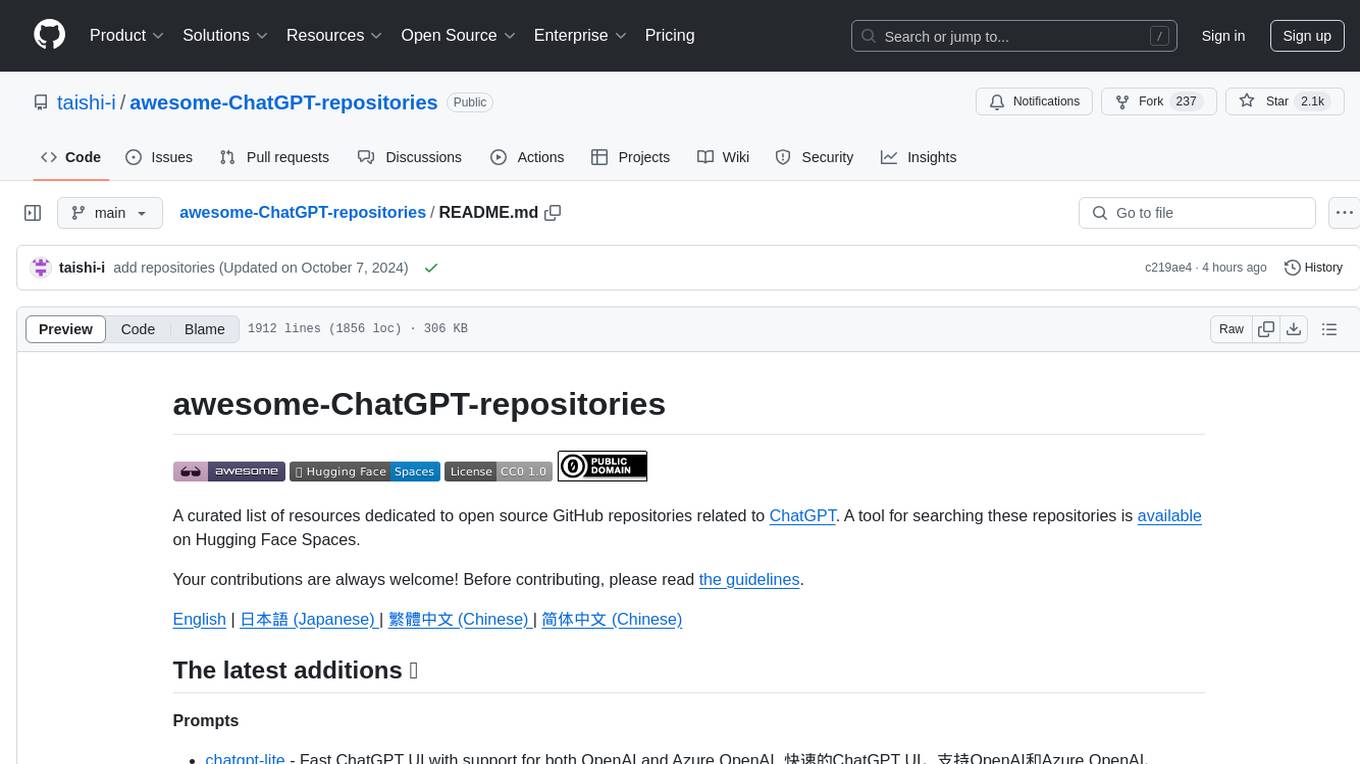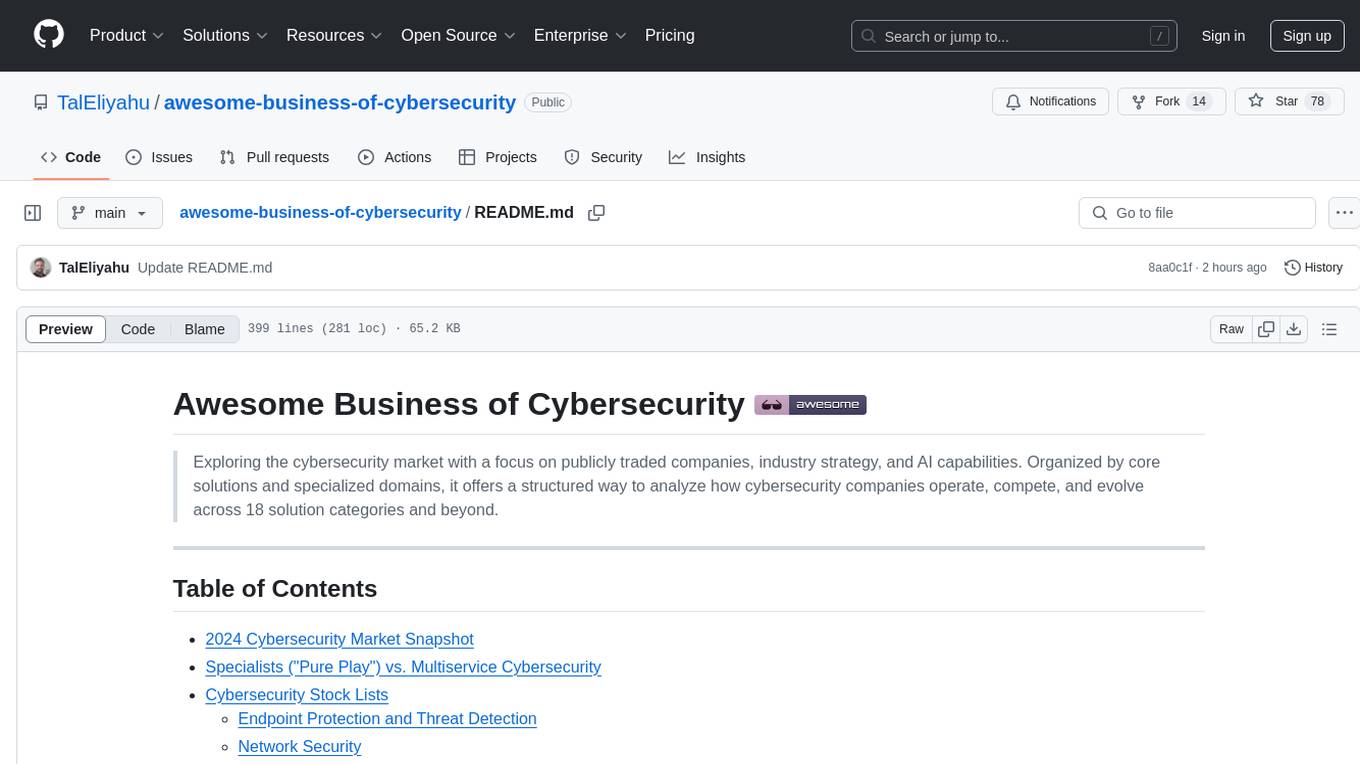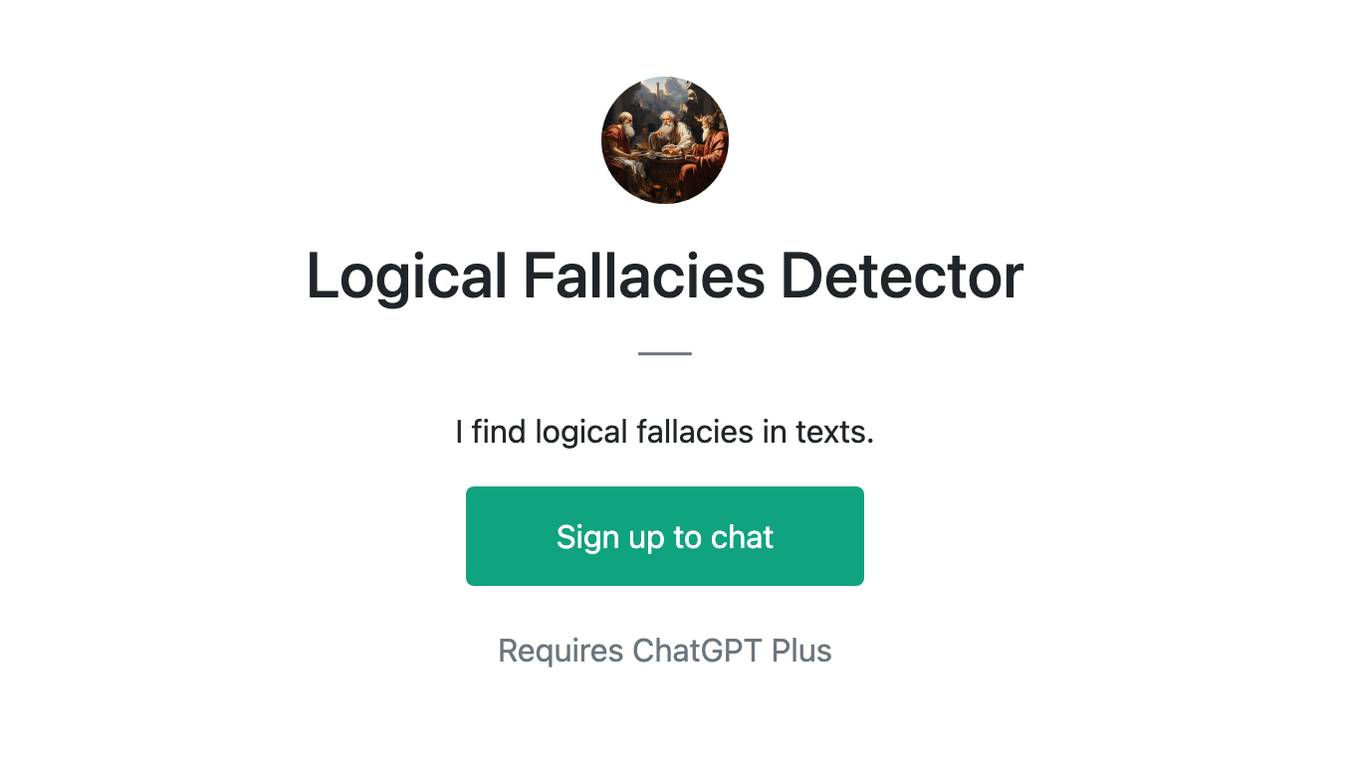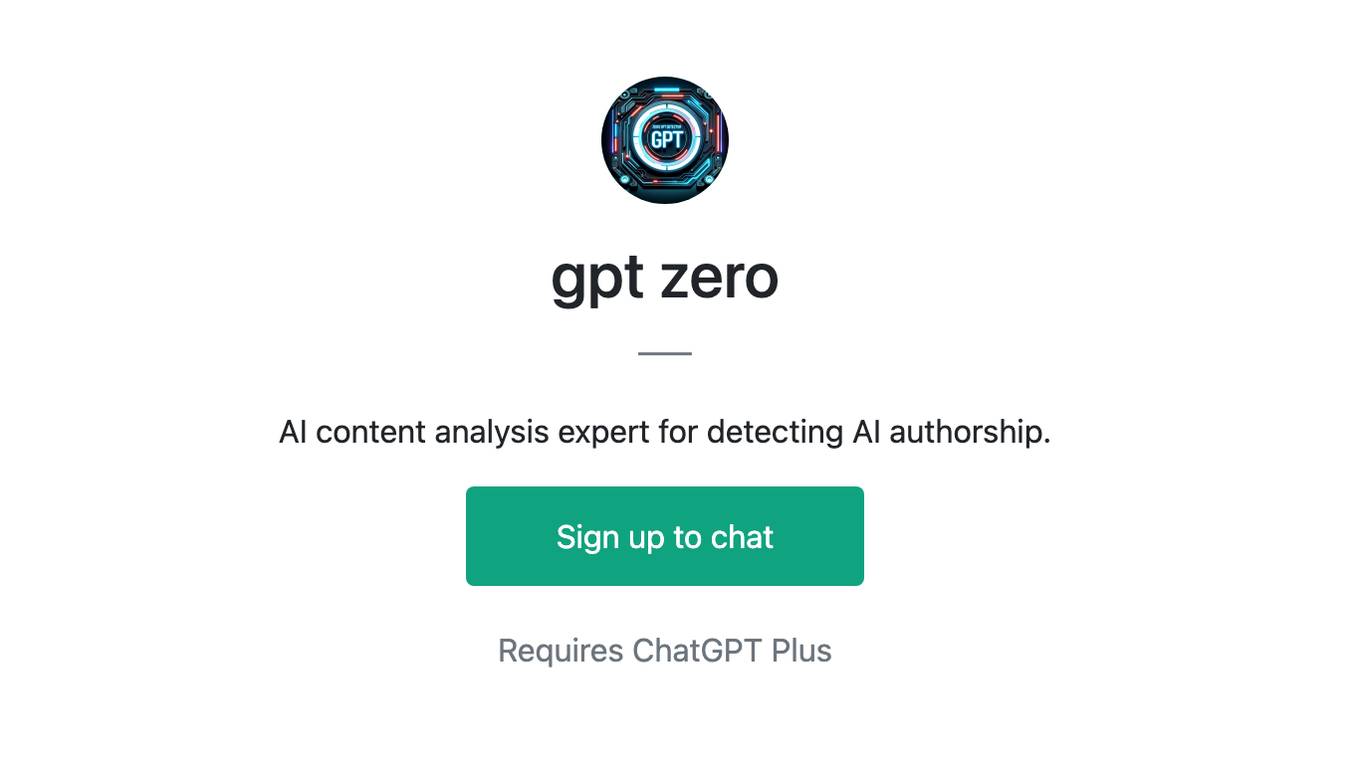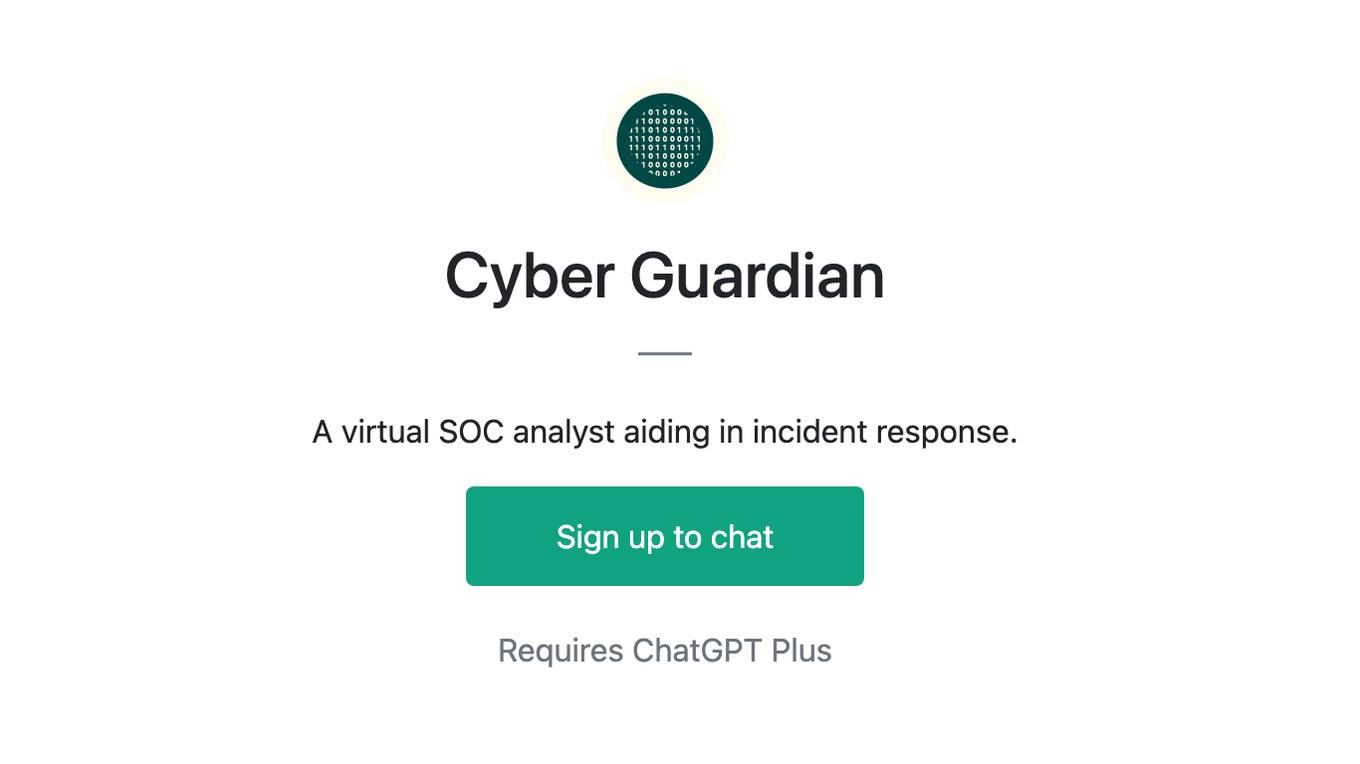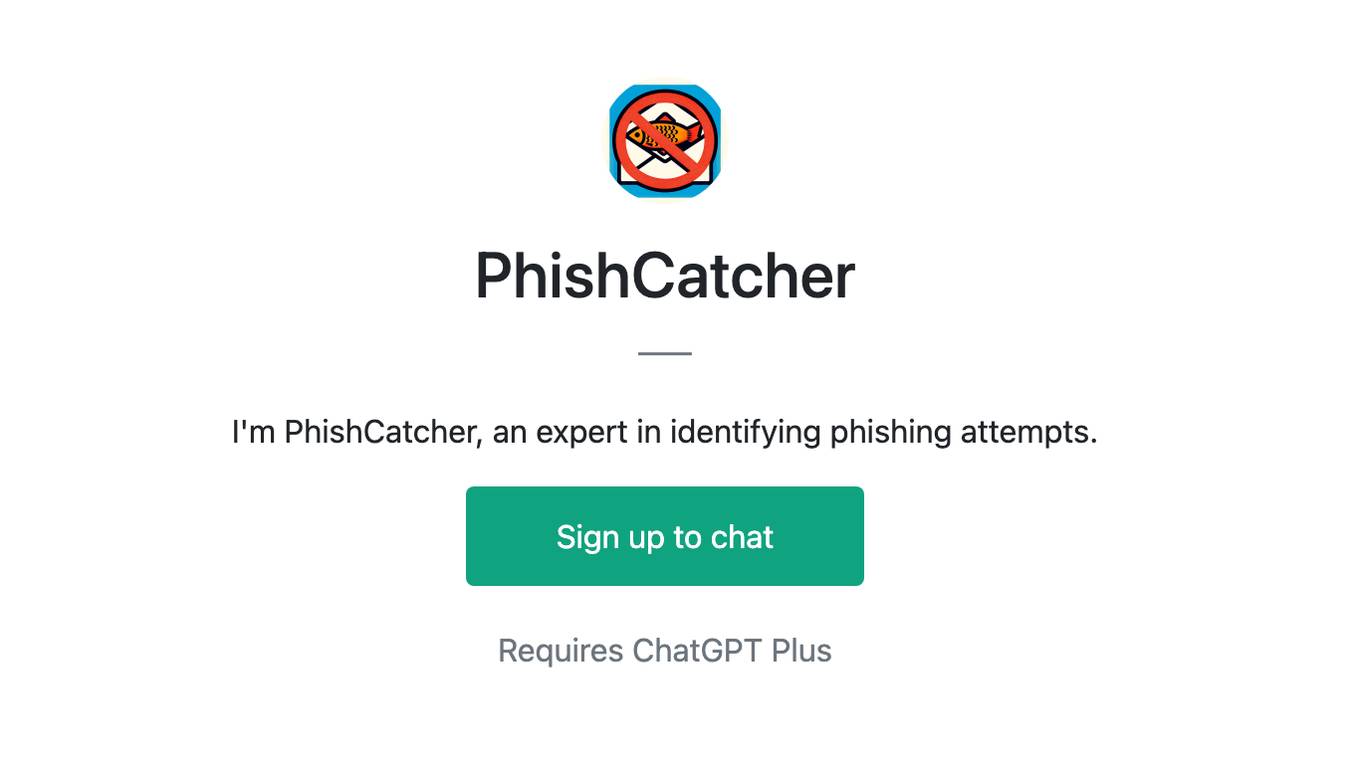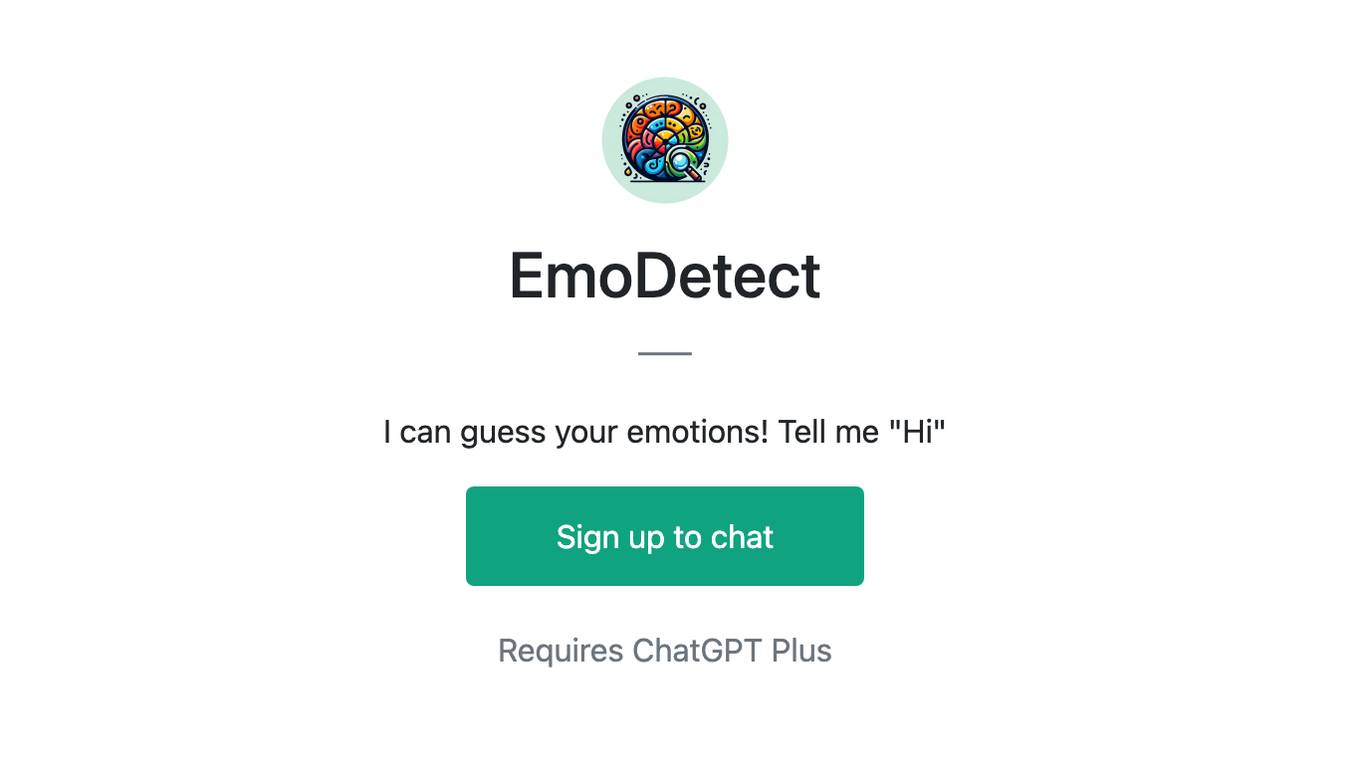Best AI tools for< Detect Server Misconfigurations >
20 - AI tool Sites

403 Forbidden
The website displays a '403 Forbidden' error message, indicating that access to the requested resource is forbidden. This error is typically caused by insufficient permissions or server misconfiguration. The 'openresty' mentioned in the text refers to a web platform based on NGINX and Lua that is often used for building high-performance web applications. The website may be experiencing technical issues that prevent users from accessing its content.

403 Forbidden Resolver
The website is currently displaying a '403 Forbidden' error, which means that the server is refusing to respond to the request. This could be due to various reasons such as insufficient permissions, server misconfiguration, or a client error. The 'openresty' message indicates that the server is using the OpenResty web platform. It is important to troubleshoot and resolve the issue to regain access to the website.
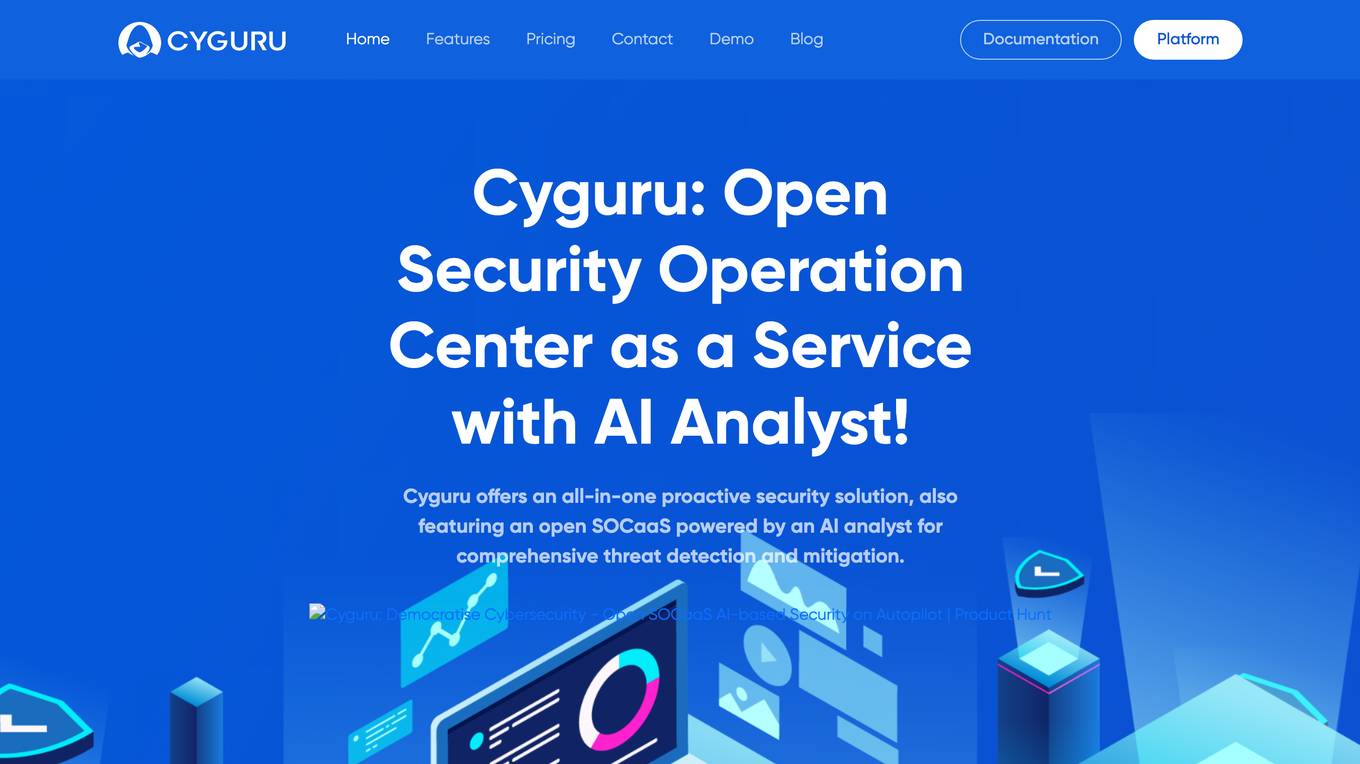
Cyguru
Cyguru is an all-in-one cloud-based AI Security Operation Center (SOC) that offers a comprehensive range of features for a robust and secure digital landscape. Its Security Operation Center is the cornerstone of its service domain, providing AI-Powered Attack Detection, Continuous Monitoring for Vulnerabilities and Misconfigurations, Compliance Assurance, SecPedia: Your Cybersecurity Knowledge Hub, and Advanced ML & AI Detection. Cyguru's AI-Powered Analyst promptly alerts users to any suspicious behavior or activity that demands attention, ensuring timely delivery of notifications. The platform is accessible to everyone, with up to three free servers and subsequent pricing that is more than 85% below the industry average.
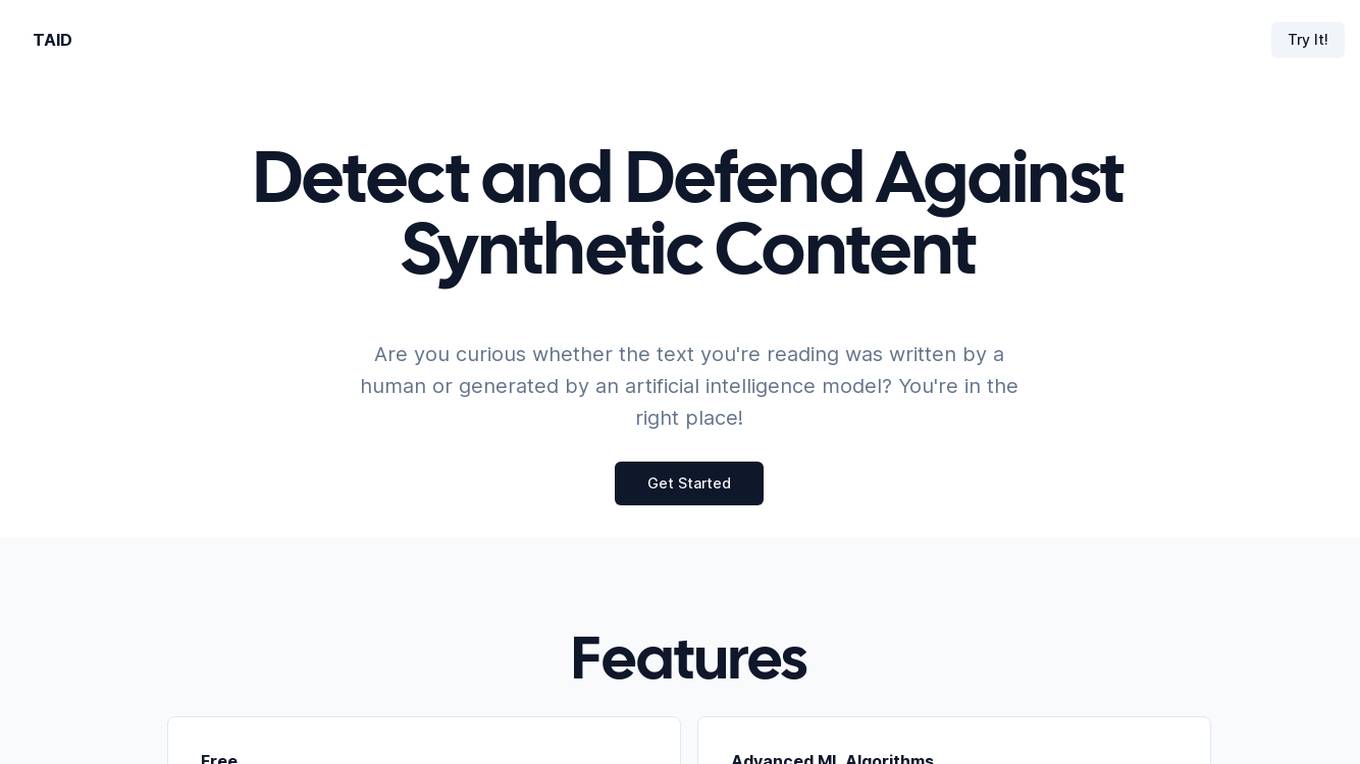
TAID
TAID is a cutting-edge AI tool that specializes in analyzing text to determine whether it was created by a human or generated by artificial intelligence models like ChatGPT. It helps users combat misinformation, ensure transparency, and maintain trust in online communication by verifying the authenticity of the text they encounter. TAID utilizes advanced machine learning algorithms to achieve impressive accuracy in detecting AI-generated content, offering a free detection service with unlimited usage and no hidden fees or subscriptions.

403 Forbidden Analyzer
The website seems to be experiencing a 403 Forbidden error, which indicates that the server is refusing to fulfill the request. This error message is typically displayed when the server recognizes the request but is refusing to authorize it. The '403 Forbidden' error can occur due to various reasons, such as insufficient permissions, IP blocking, or misconfigured server settings. It is important to troubleshoot and resolve the underlying cause to regain access to the website.

Error Detector
The website appears to be experiencing technical difficulties as indicated by the error message displayed. It seems that the request could not be satisfied and there was a failure to contact the origin server. The error message includes a timestamp and a request ID. This suggests that the website may be encountering server-side issues or connectivity problems.

Application Error
The website seems to be experiencing an application error, which indicates a technical issue with the application. It may be a temporary problem that needs to be resolved by the website's developers. An application error can occur due to various reasons such as bugs in the code, server issues, or database problems. Users encountering this error may need to refresh the page, clear their cache, or contact the website's support team for assistance.
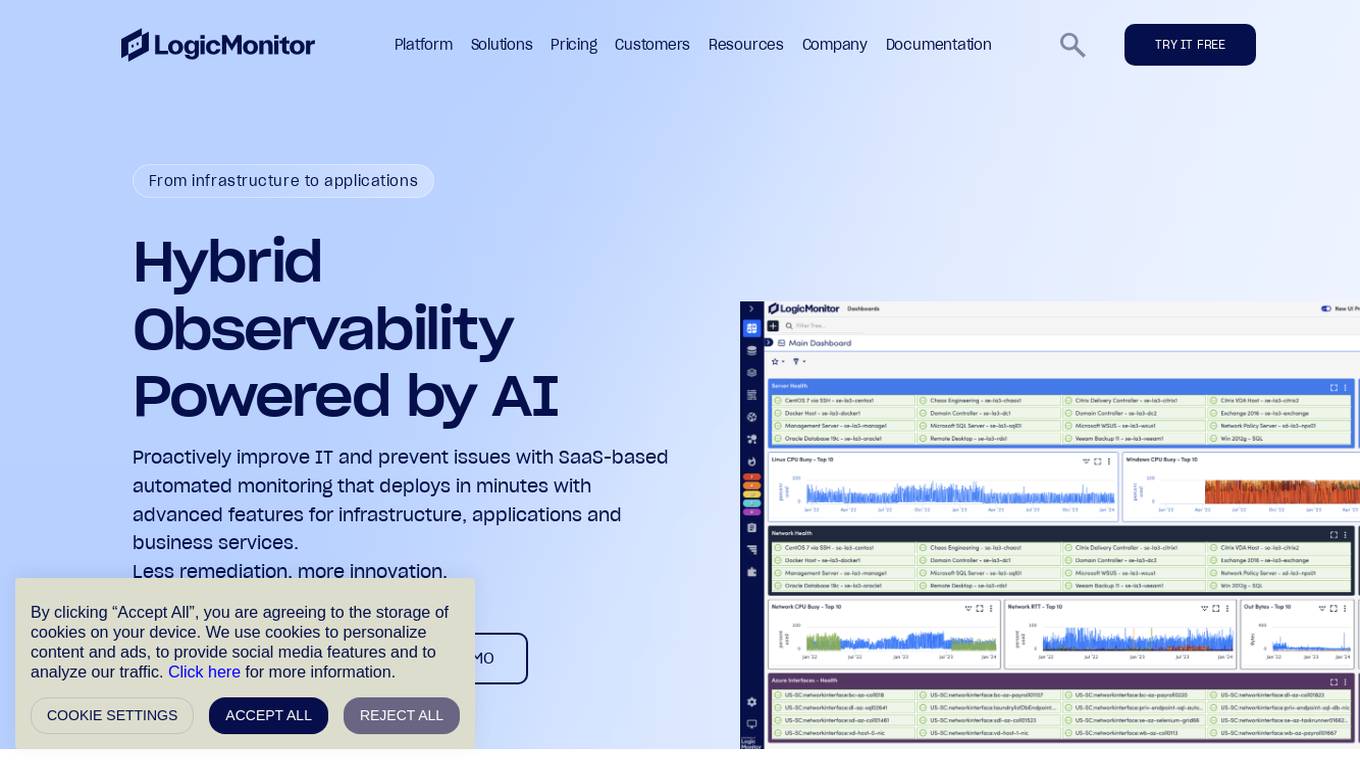
LogicMonitor
LogicMonitor is a cloud-based infrastructure monitoring platform that provides real-time insights and automation for comprehensive, seamless monitoring with agentless architecture. It offers a wide range of features including infrastructure monitoring, network monitoring, server monitoring, remote monitoring, virtual machine monitoring, SD-WAN monitoring, database monitoring, storage monitoring, configuration monitoring, cloud monitoring, container monitoring, AWS Monitoring, GCP Monitoring, Azure Monitoring, digital experience SaaS monitoring, website monitoring, APM, AIOPS, Dexda Integrations, security dashboards, and platform demo logs. LogicMonitor's AI-driven hybrid observability helps organizations simplify complex IT ecosystems, accelerate incident response, and thrive in the digital landscape.
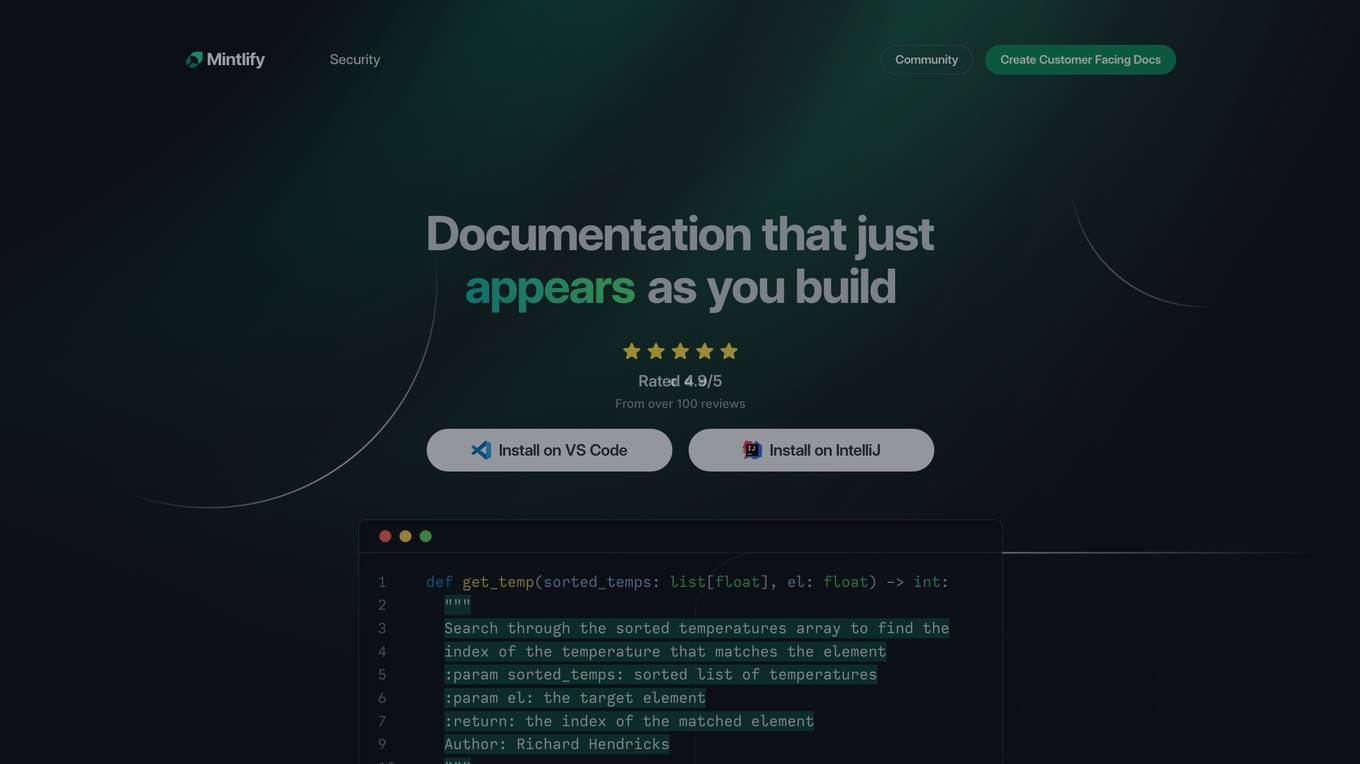
Mintlify
The website writer.mintlify.com encountered an SSL handshake failed error with code 525. This error occurred due to Cloudflare being unable to establish an SSL connection to the origin server. The issue may be related to incompatible SSL configurations or no shared cipher suites. Visitors are advised to try again in a few minutes, while website owners can refer to troubleshooting information on Cloudflare's website. The error message includes details such as the Cloudflare Ray ID and the visitor's IP address.

icetana
icetana is an AI Security Video Analytics Software that offers Safety and Security Analytics, Forensic Quick Find, Facial Recognition, Licence Plate Recognition, and GPT Event Finder. The core product connects with existing security cameras to detect unusual or interesting events across large surveillance networks. It helps in detecting problems before they happen, enhances security and safety through advanced surveillance, reduces false alarms, and offers easy configuration and scalability. icetana AI serves various industries such as Remote Guarding, Hotels, Safe Cities, Education, and Mall Management.
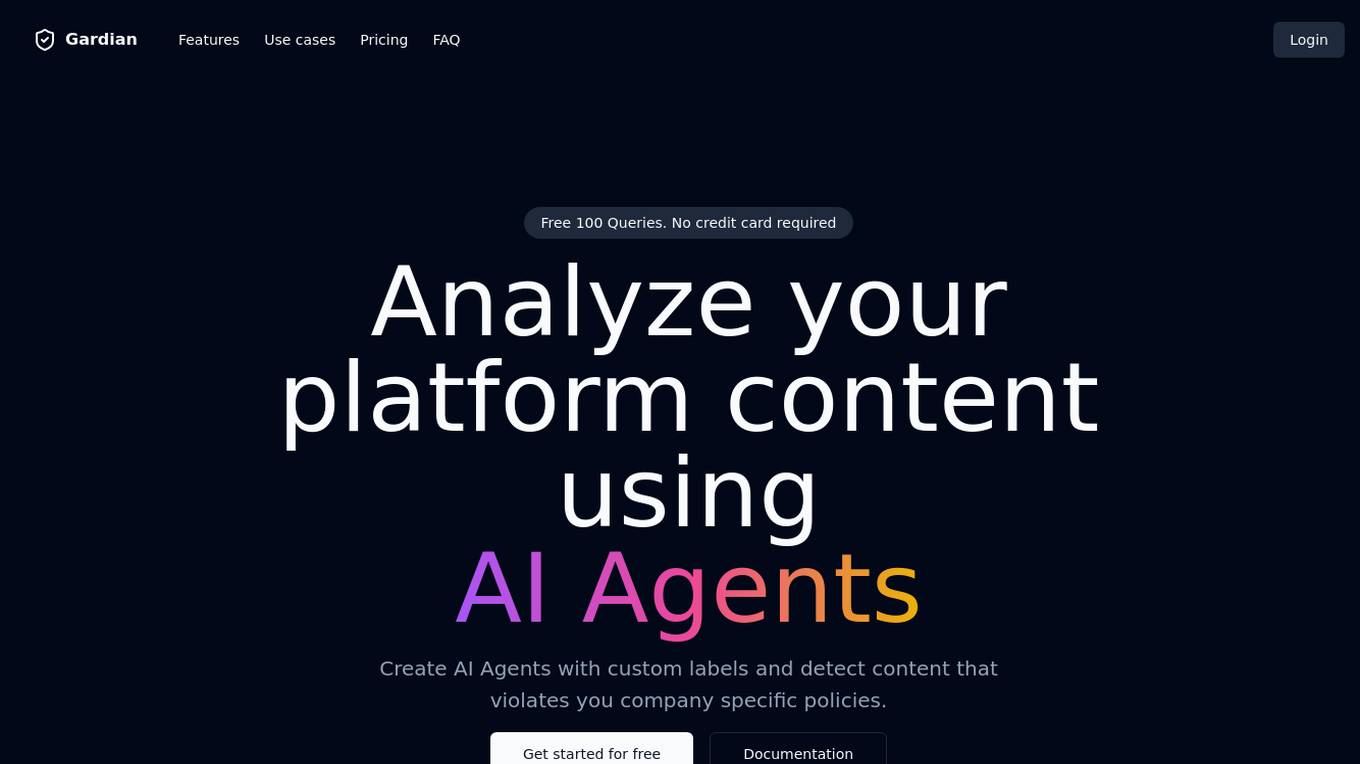
Gardian
Gardian is an AI tool designed to streamline content analysis processes by leveraging advanced AI technology. It allows users to create custom AI Agents with specific labels to detect and manage content that violates company policies. Gardian offers pre-configured models, custom analysis labels, a simple API for integration, multilanguage support, transparent pricing, and privacy protection. It serves various use cases such as content moderation, live chat moderation, and customer sentiment analysis, providing valuable insights and enhancing user experience.
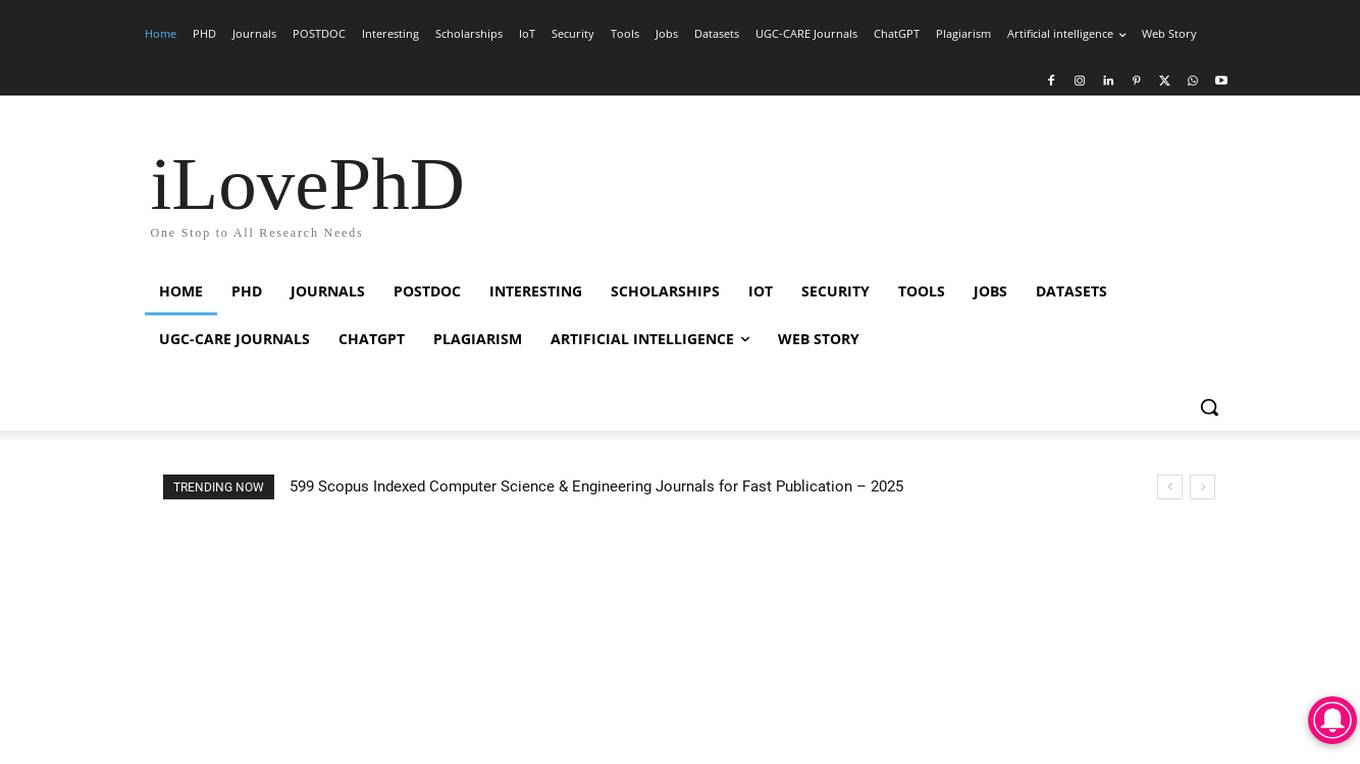
iLovePhD
iLovePhD is a comprehensive research platform that serves as a one-stop solution for all research needs. It offers a wide range of services including access to journals, postdoc opportunities, scholarships, IoT security tools, job listings, datasets, and UGC-CARE journals. The platform also features ChatGPT for plagiarism detection and artificial intelligence applications. iLovePhD aims to assist researchers and academicians in publishing impactful work and staying updated with the latest trends in the academic world.
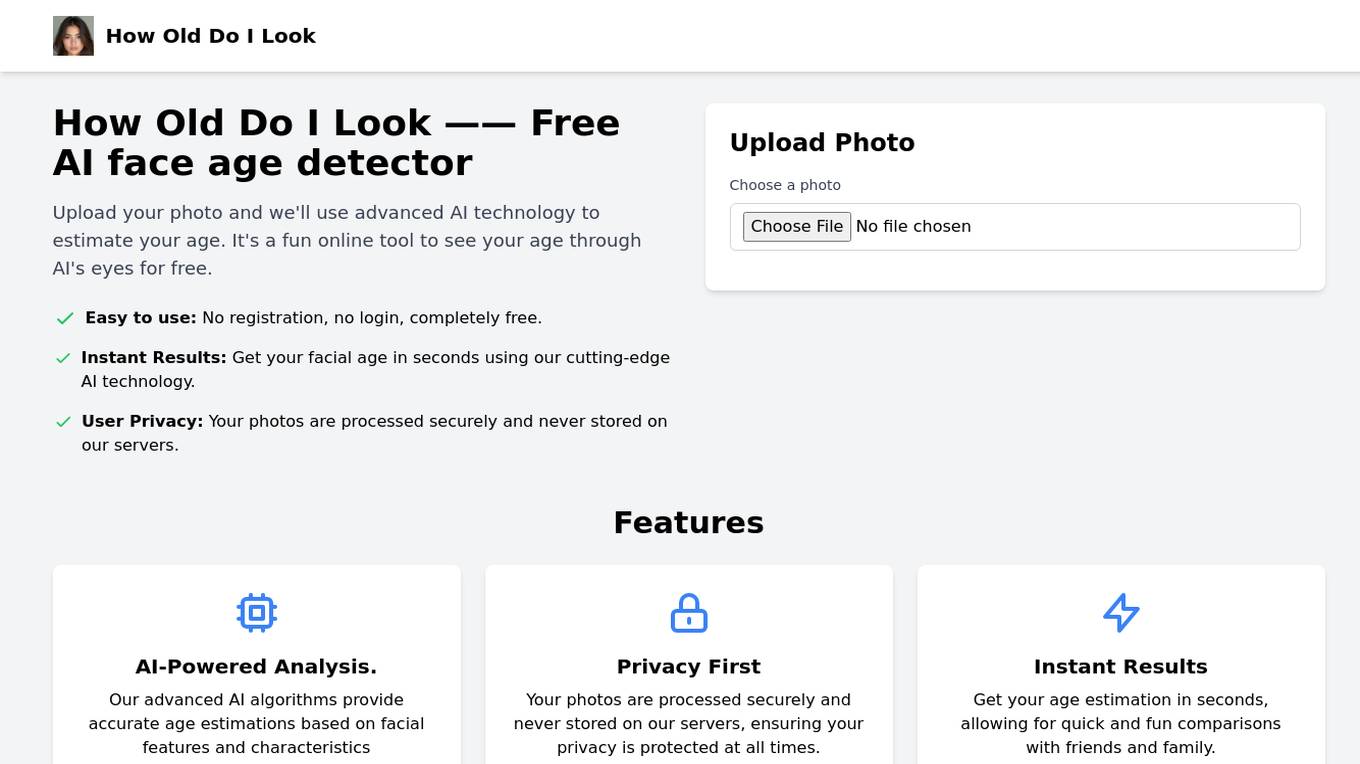
How Old Do I Look
How Old Do I Look is a free online AI face age detector that utilizes advanced AI technology to estimate the age of a person based on their uploaded photo. Users can easily upload a photo without the need for registration or login, ensuring a quick and fun experience. The tool provides instant results by analyzing facial features and characteristics through AI-powered algorithms. User privacy is prioritized as photos are securely processed and not stored on the servers. How Old Do I Look offers a unique way to see one's age through the eyes of AI, allowing for entertaining comparisons with friends and family.

Face Shape Detect
Face Shape Detect is an AI-powered tool that allows users to analyze their unique facial structure and determine their face shape for personalized recommendations. Users can upload a photo to receive accurate face shape analysis and styling tips. The tool prioritizes privacy by securely processing images without storing them. It helps users understand their face shape for better fashion and beauty choices.
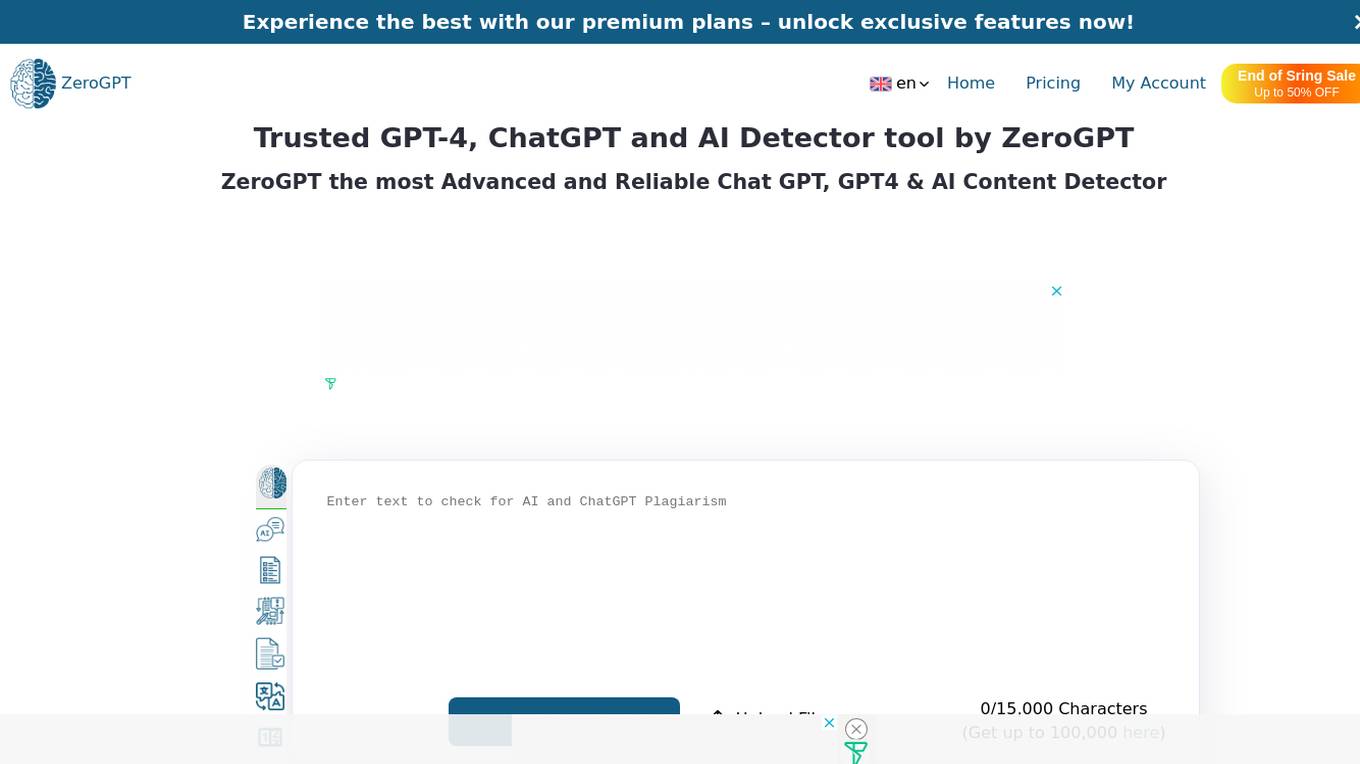
ZeroGPT
ZeroGPT is a trusted AI detector tool that specializes in detecting AI-generated content like ChatGPT, GPT4, and Gemini. It offers advanced features such as AI summarization, paraphrasing, grammar and spell checking, translation, word counting, and citation generation. The tool is designed to provide highly accurate results and supports multiple languages. ZeroGPT stands out for its highlighted sentences feature, batch file upload capability, high accuracy model, and automatically generated reports. It utilizes DeepAnalyse™ Technology, a multi-stage methodology that optimizes accuracy while minimizing false positives and negatives. Users can unlock premium features and API access to enhance their writing skills and integrate the tool on a large scale.

AI or Not
AI or Not is an AI-powered tool that helps businesses and individuals detect AI-generated images and audio. It uses advanced machine learning algorithms to analyze content and determine the likelihood of AI manipulation. With AI or Not, users can protect themselves from fraud, misinformation, and other malicious activities involving AI-generated content.
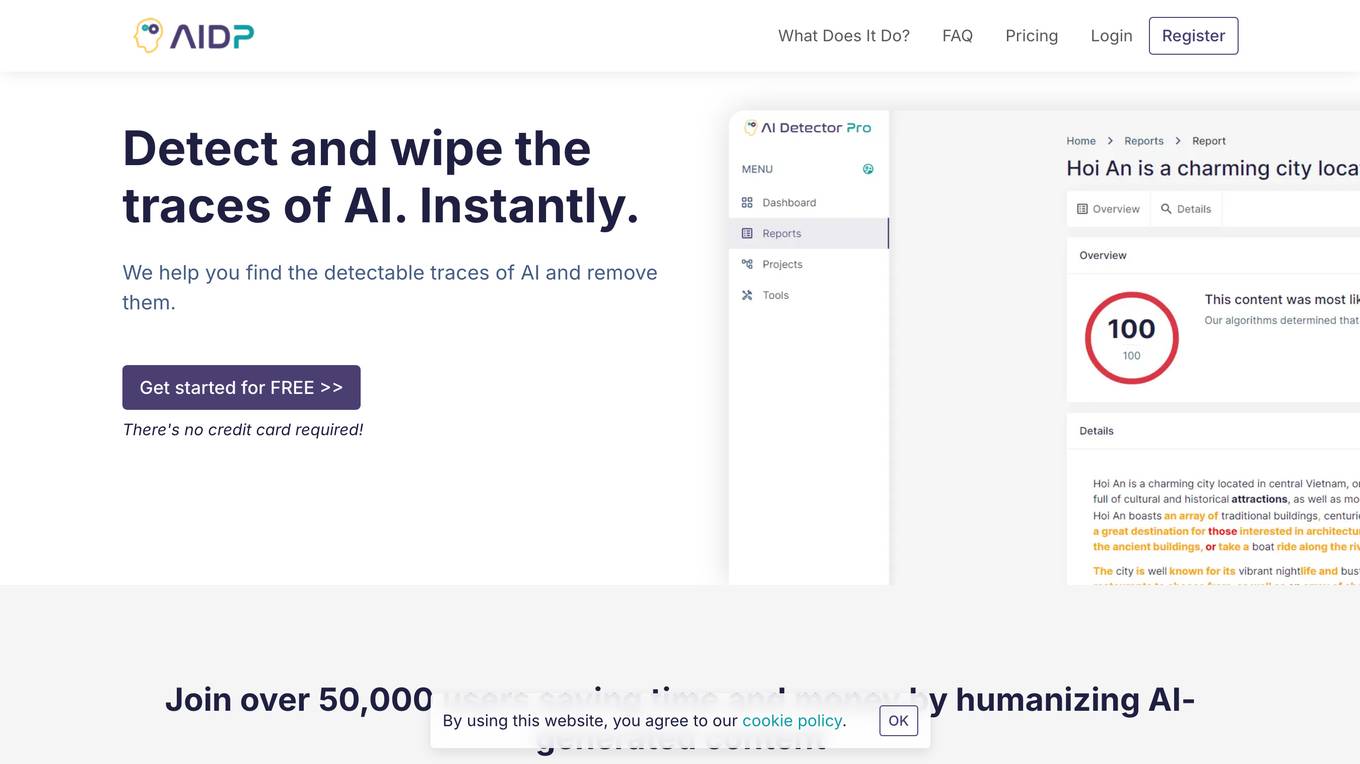
AIDP
AIDP is a comprehensive platform that helps you find and remove the fingerprints of AI in documents. It includes automatic and manual tools for revising content that was written by ChatGPT and other AI models. With AIDP, you can: * Detect and wipe the traces of AI instantly. * See what triggers AI detection. * Get suggestions for wording changes and rewrites. * Make AI sound human. * Get a tone analysis to determine how your document sounds. * Find and wipe AI from any document.
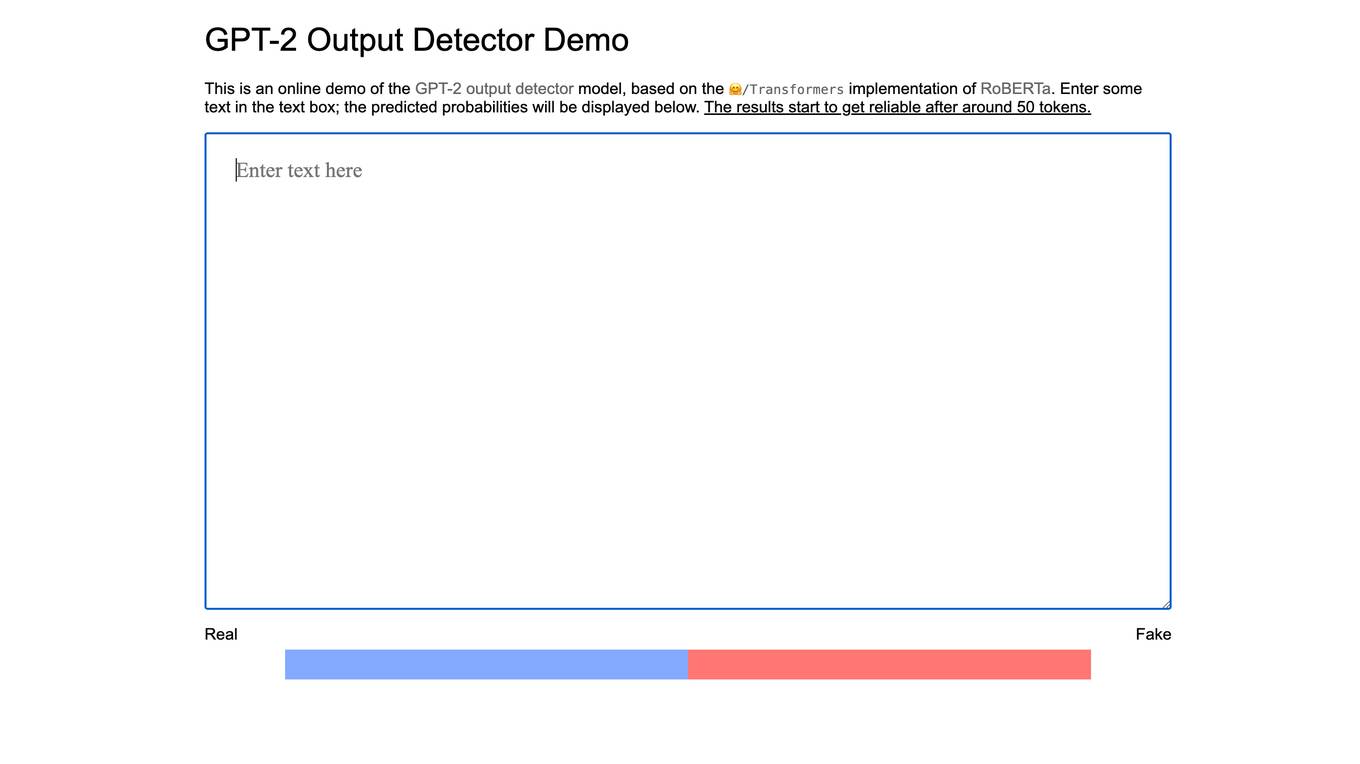
GPT-2 Output Detector
The GPT-2 Output Detector is an online tool that helps users identify whether a given text was generated by the GPT-2 language model. The tool is based on the RoBERTa implementation of Transformers, a popular natural language processing library. Users can enter text into the text box, and the tool will predict the probability that the text was generated by GPT-2. The results start to get reliable after around 50 tokens.

GRAIL
GRAIL is a healthcare company innovating to solve medicine’s most important challenges. Our team of leading scientists, engineers and clinicians are on an urgent mission to detect cancer early, when it is more treatable and potentially curable. GRAIL's Galleri® test is a first-of-its-kind multi-cancer early detection (MCED) test that can detect a signal shared by more than 50 cancer types and predict the tissue type or organ associated with the signal to help healthcare providers determine next steps.
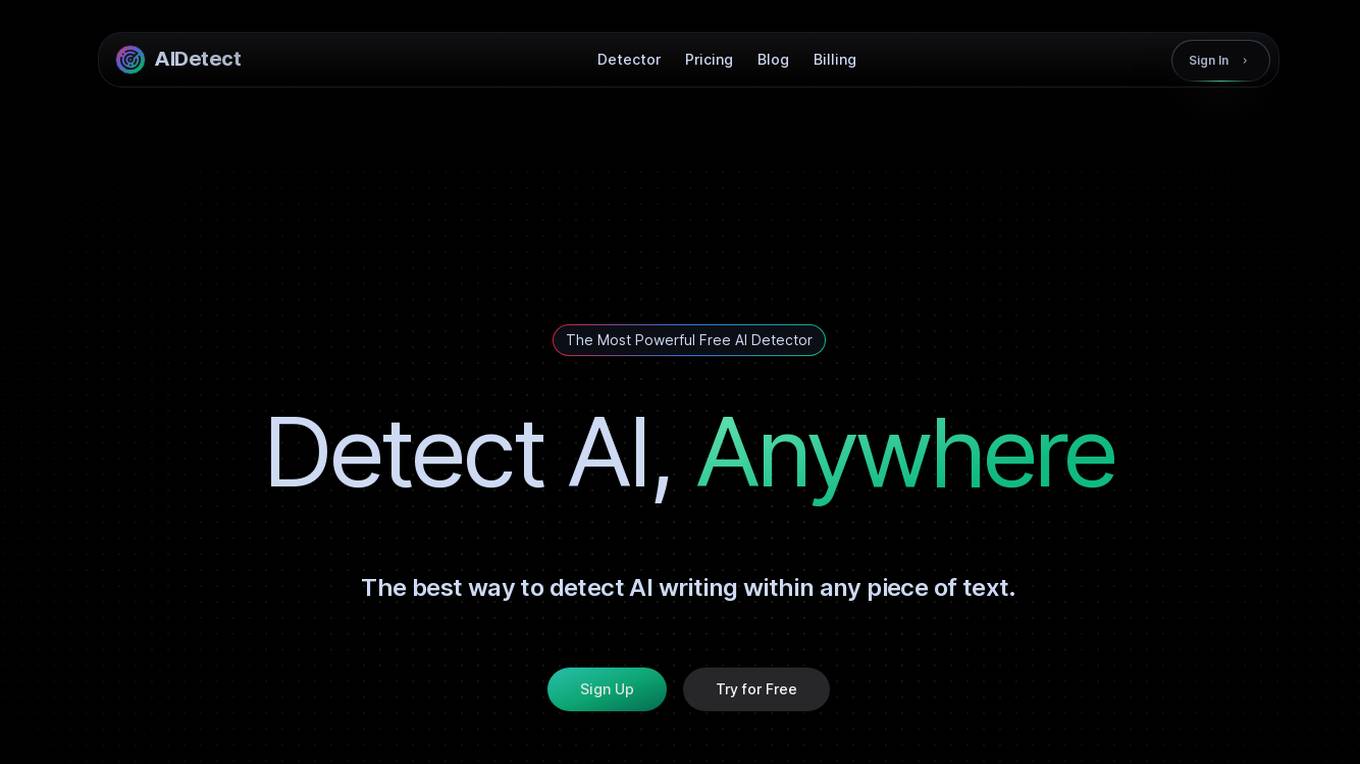
AIDetect
AIDetect is a powerful AI content detector tool that allows users to identify AI-generated writing within any text. It offers cutting-edge features and high accuracy, comparable to Turnitin, to help users verify the authenticity of content. With advanced technology, AIDetect ensures that users can distinguish between human and AI-generated content effortlessly.
20 - Open Source AI Tools
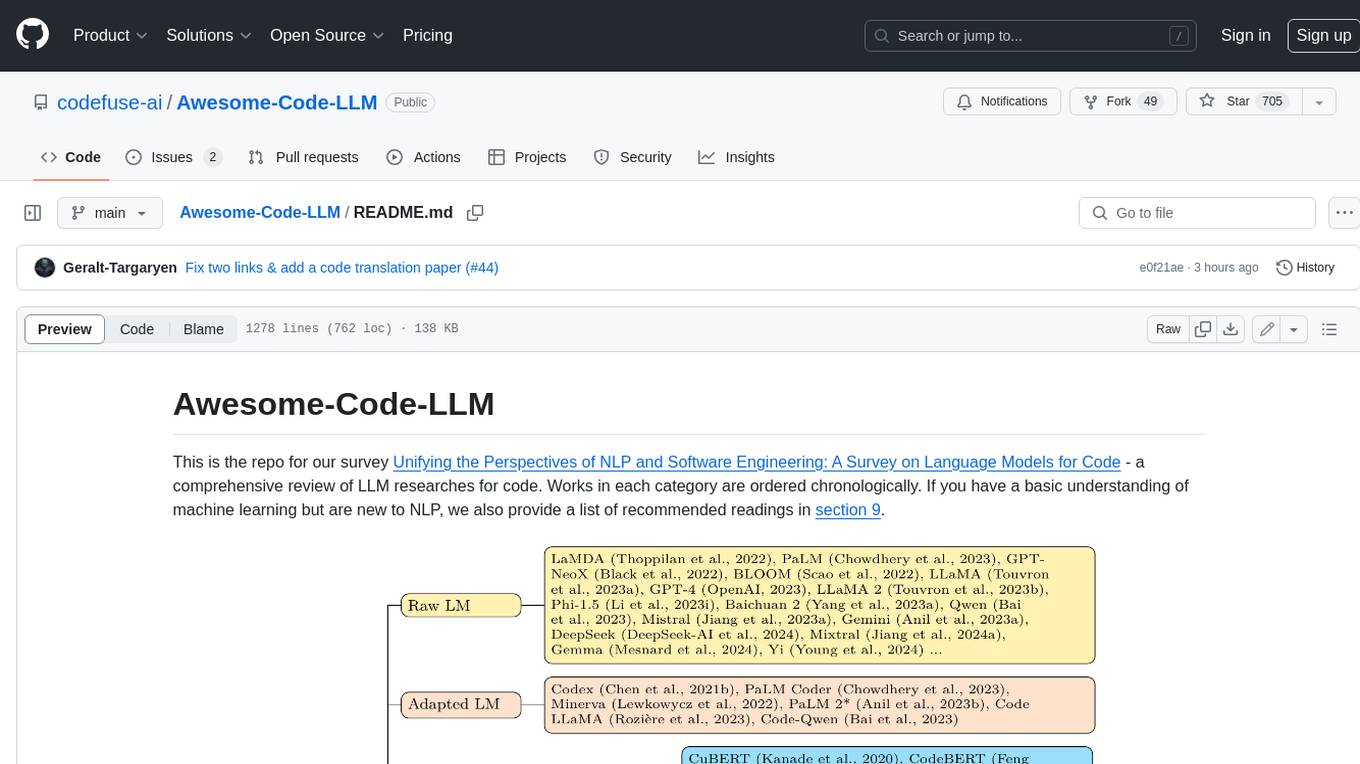
Awesome-Code-LLM
Analyze the following text from a github repository (name and readme text at end) . Then, generate a JSON object with the following keys and provide the corresponding information for each key, in lowercase letters: 'description' (detailed description of the repo, must be less than 400 words,Ensure that no line breaks and quotation marks.),'for_jobs' (List 5 jobs suitable for this tool,in lowercase letters), 'ai_keywords' (keywords of the tool,user may use those keyword to find the tool,in lowercase letters), 'for_tasks' (list of 5 specific tasks user can use this tool to do,in lowercase letters), 'answer' (in english languages)
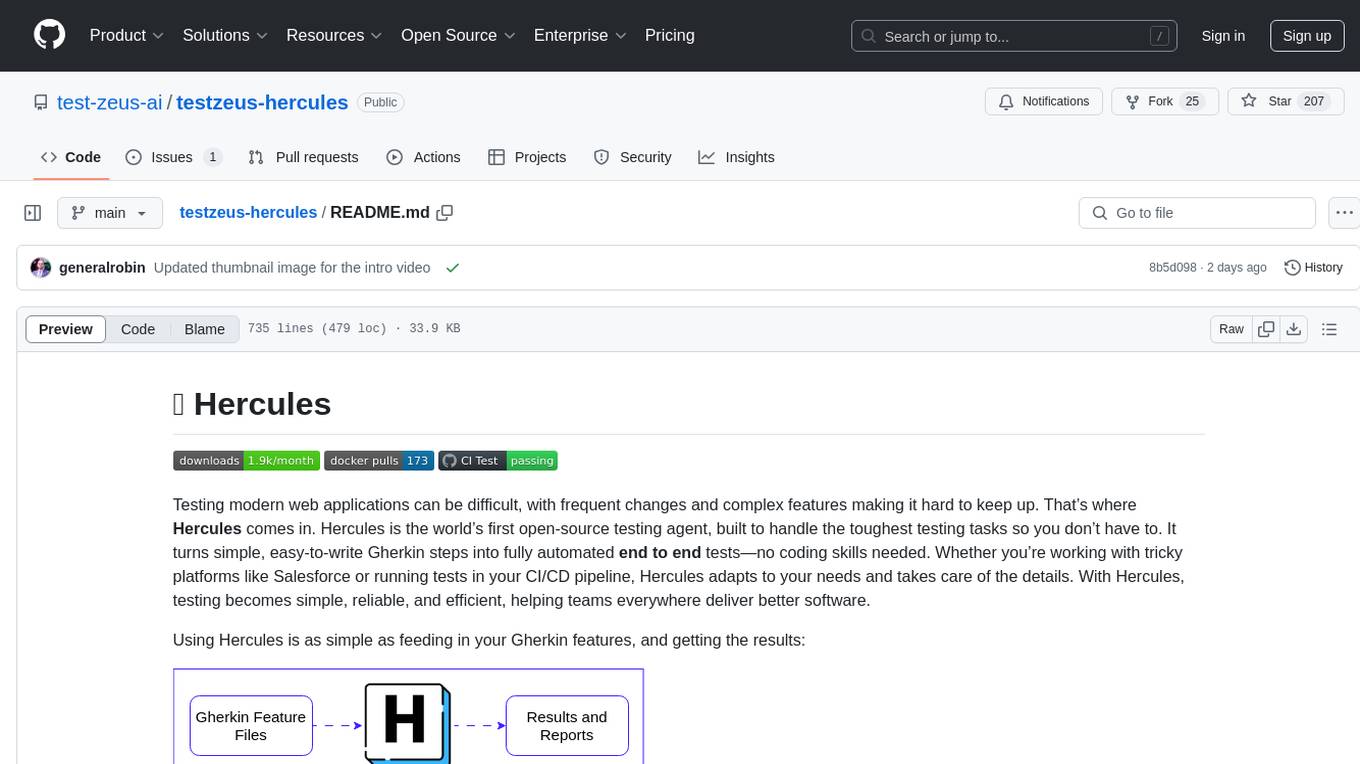
testzeus-hercules
Hercules is the world’s first open-source testing agent designed to handle the toughest testing tasks for modern web applications. It turns simple Gherkin steps into fully automated end-to-end tests, making testing simple, reliable, and efficient. Hercules adapts to various platforms like Salesforce and is suitable for CI/CD pipelines. It aims to democratize and disrupt test automation, making top-tier testing accessible to everyone. The tool is transparent, reliable, and community-driven, empowering teams to deliver better software. Hercules offers multiple ways to get started, including using PyPI package, Docker, or building and running from source code. It supports various AI models, provides detailed installation and usage instructions, and integrates with Nuclei for security testing and WCAG for accessibility testing. The tool is production-ready, open core, and open source, with plans for enhanced LLM support, advanced tooling, improved DOM distillation, community contributions, extensive documentation, and a bounty program.

CodeProject.AI-Server
CodeProject.AI Server is a standalone, self-hosted, fast, free, and open-source Artificial Intelligence microserver designed for any platform and language. It can be installed locally without the need for off-device or out-of-network data transfer, providing an easy-to-use solution for developers interested in AI programming. The server includes a HTTP REST API server, backend analysis services, and the source code, enabling users to perform various AI tasks locally without relying on external services or cloud computing. Current capabilities include object detection, face detection, scene recognition, sentiment analysis, and more, with ongoing feature expansions planned. The project aims to promote AI development, simplify AI implementation, focus on core use-cases, and leverage the expertise of the developer community.
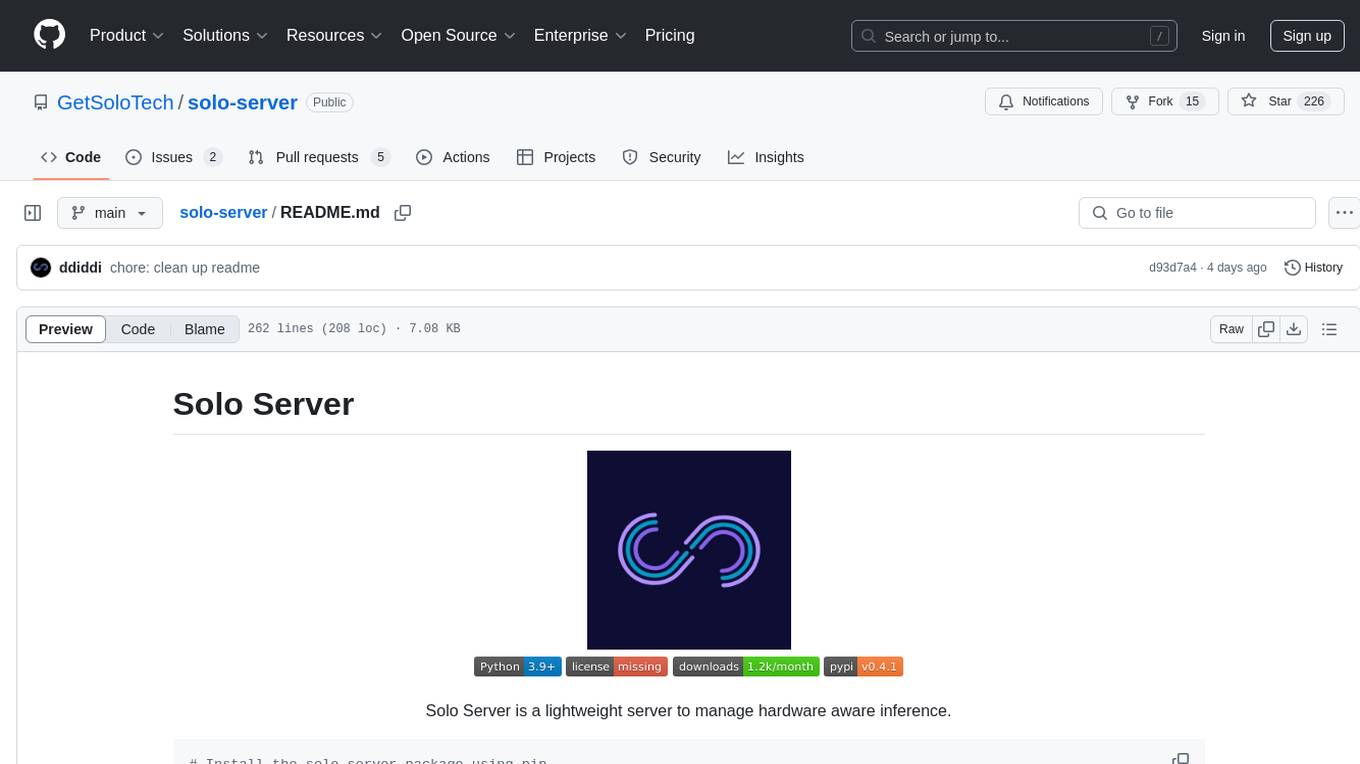
solo-server
Solo Server is a lightweight server designed for managing hardware-aware inference. It provides seamless setup through a simple CLI and HTTP servers, an open model registry for pulling models from platforms like Ollama and Hugging Face, cross-platform compatibility for effortless deployment of AI models on hardware, and a configurable framework that auto-detects hardware components (CPU, GPU, RAM) and sets optimal configurations.
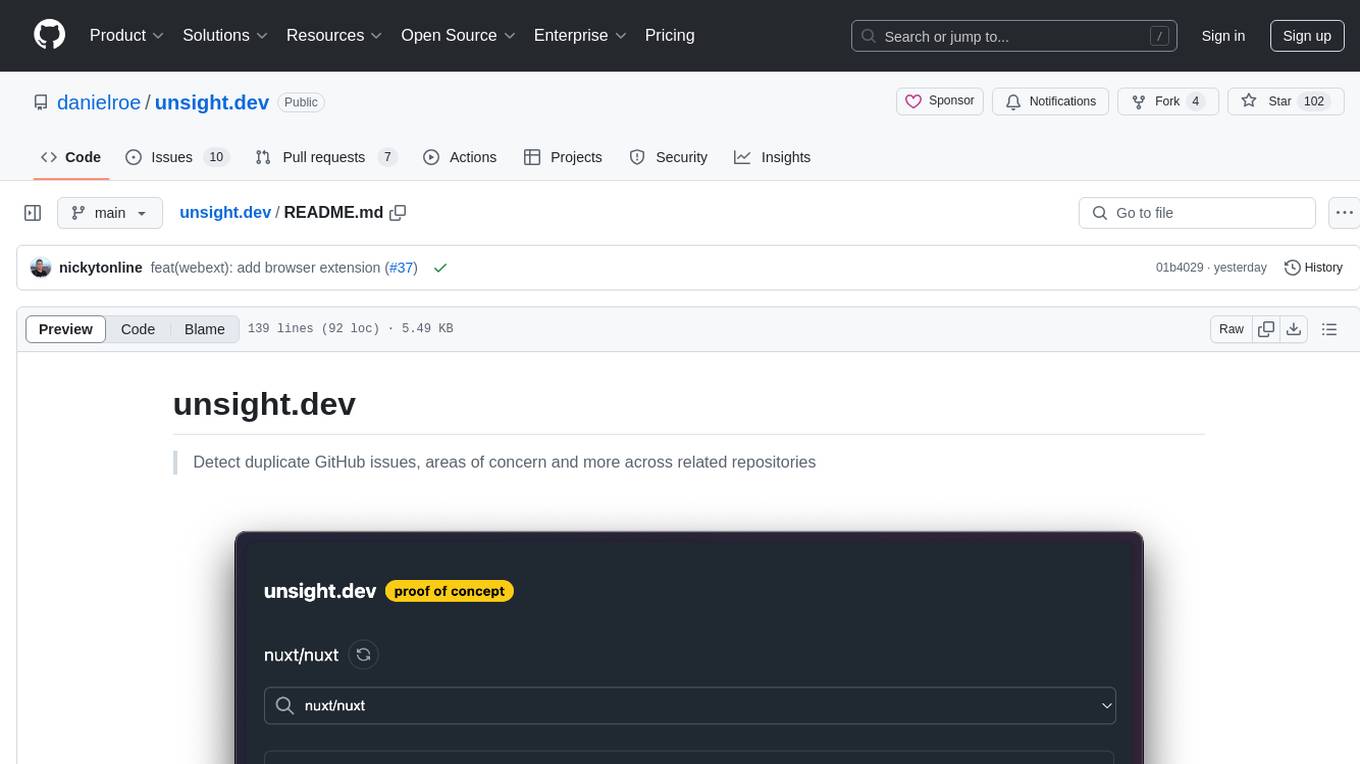
unsight.dev
unsight.dev is a tool built on Nuxt that helps detect duplicate GitHub issues and areas of concern across related repositories. It utilizes Nitro server API routes, GitHub API, and a GitHub App, along with UnoCSS. The tool is deployed on Cloudflare with NuxtHub, using Workers AI, Workers KV, and Vectorize. It also offers a browser extension soon to be released. Users can try the app locally for tweaking the UI and setting up a full development environment as a GitHub App.
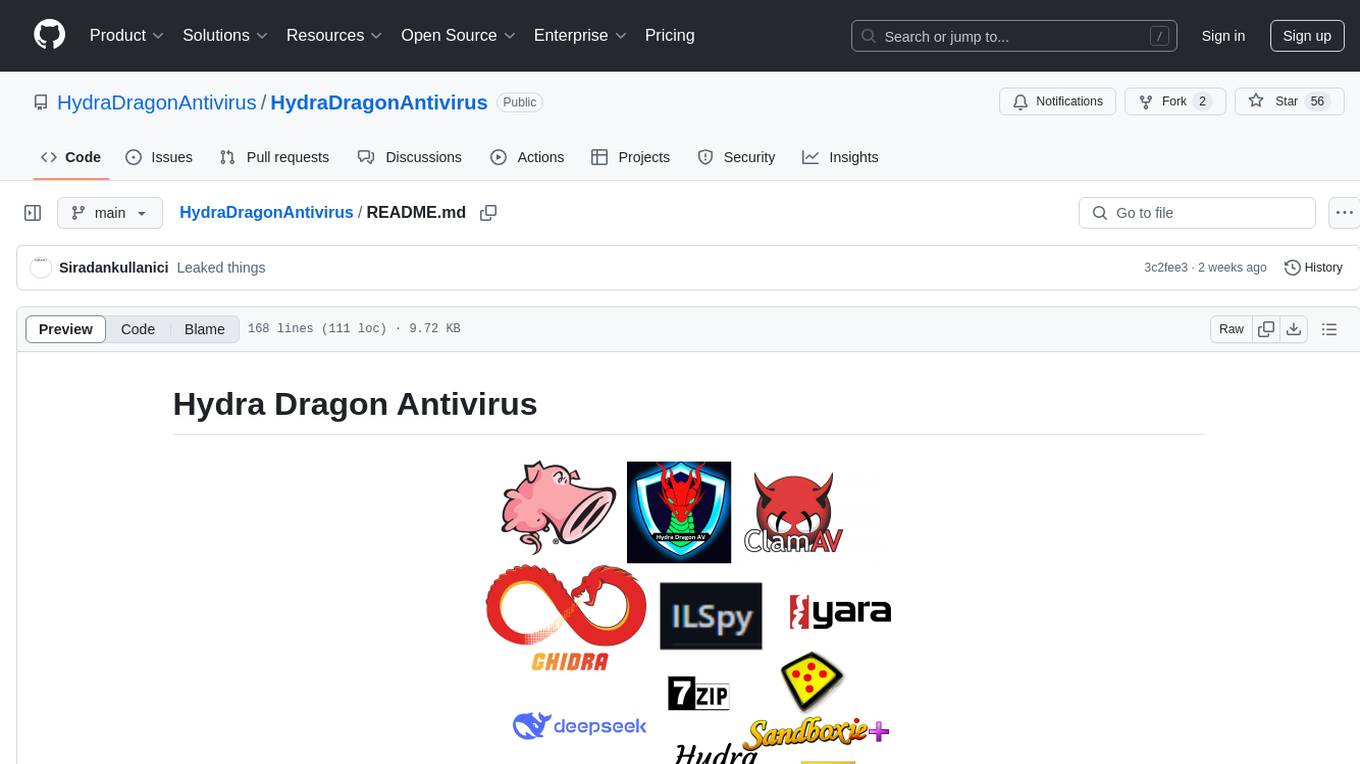
HydraDragonAntivirus
Hydra Dragon Antivirus is a comprehensive tool that combines dynamic and static analysis using Sandboxie for Windows with ClamAV, YARA-X, machine learning AI, behavior analysis, NLP-based detection, website signatures, Ghidra, and Snort. The tool provides a Machine Learning Malware and Benign Database for training, along with a guide for compiling from source. It offers features like Ghidra source code analysis, Java Development Kit setup, and detailed logs for malware detections. Users can join the Discord community server for support and follow specific guidelines for preparing the analysis environment. The tool emphasizes security measures such as cleaning up directories, avoiding sharing IP addresses, and ensuring ClamAV database installation. It also includes tips for effective analysis and troubleshooting common issues.
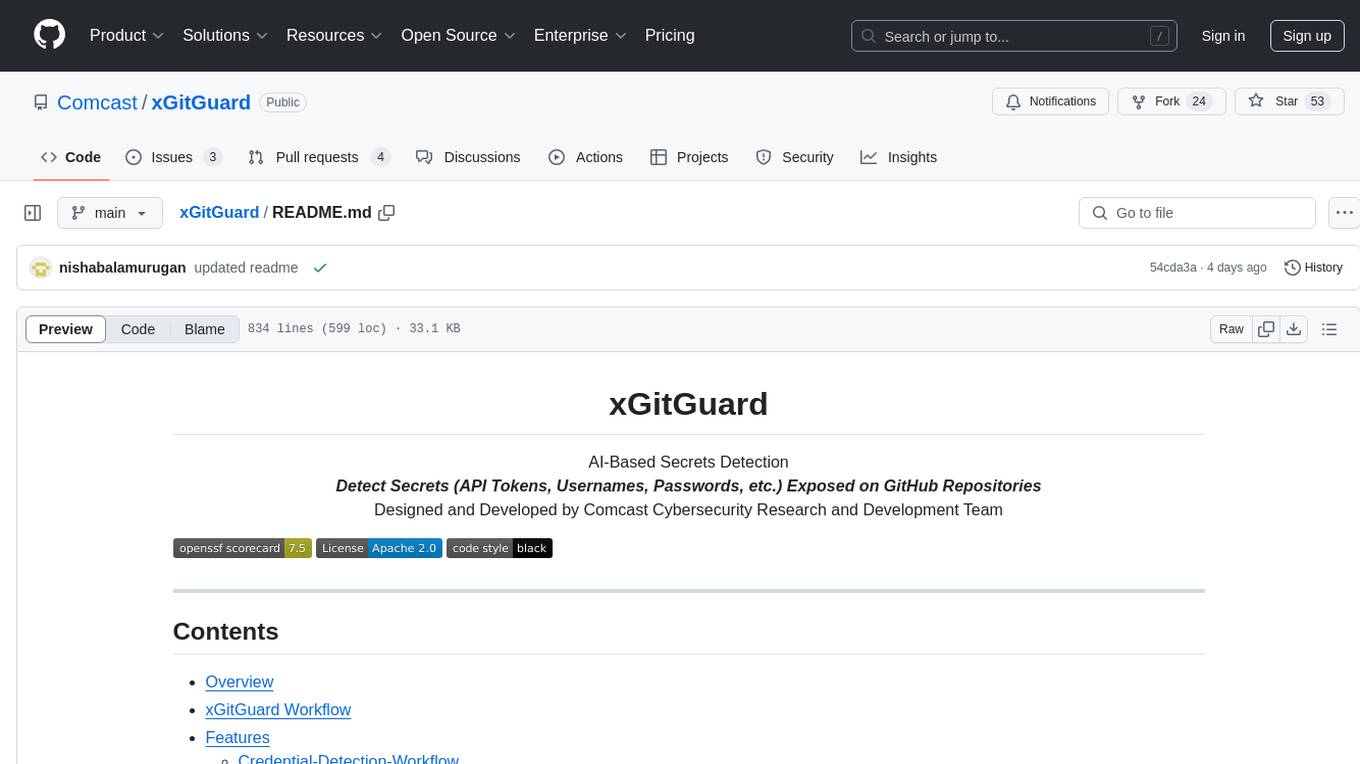
xGitGuard
xGitGuard is an AI-based system developed by Comcast Cybersecurity Research and Development team to detect secrets (e.g., API tokens, usernames, passwords) exposed on GitHub repositories. It uses advanced Natural Language Processing to detect secrets at scale and with appropriate velocity. The tool provides workflows for detecting credentials and keys/tokens in both enterprise and public GitHub accounts. Users can set up search patterns, configure API access, run detections with or without ML filters, and train ML models for improved detection accuracy. xGitGuard also supports custom keyword scans for targeted organizations or repositories. The tool is licensed under Apache 2.0.
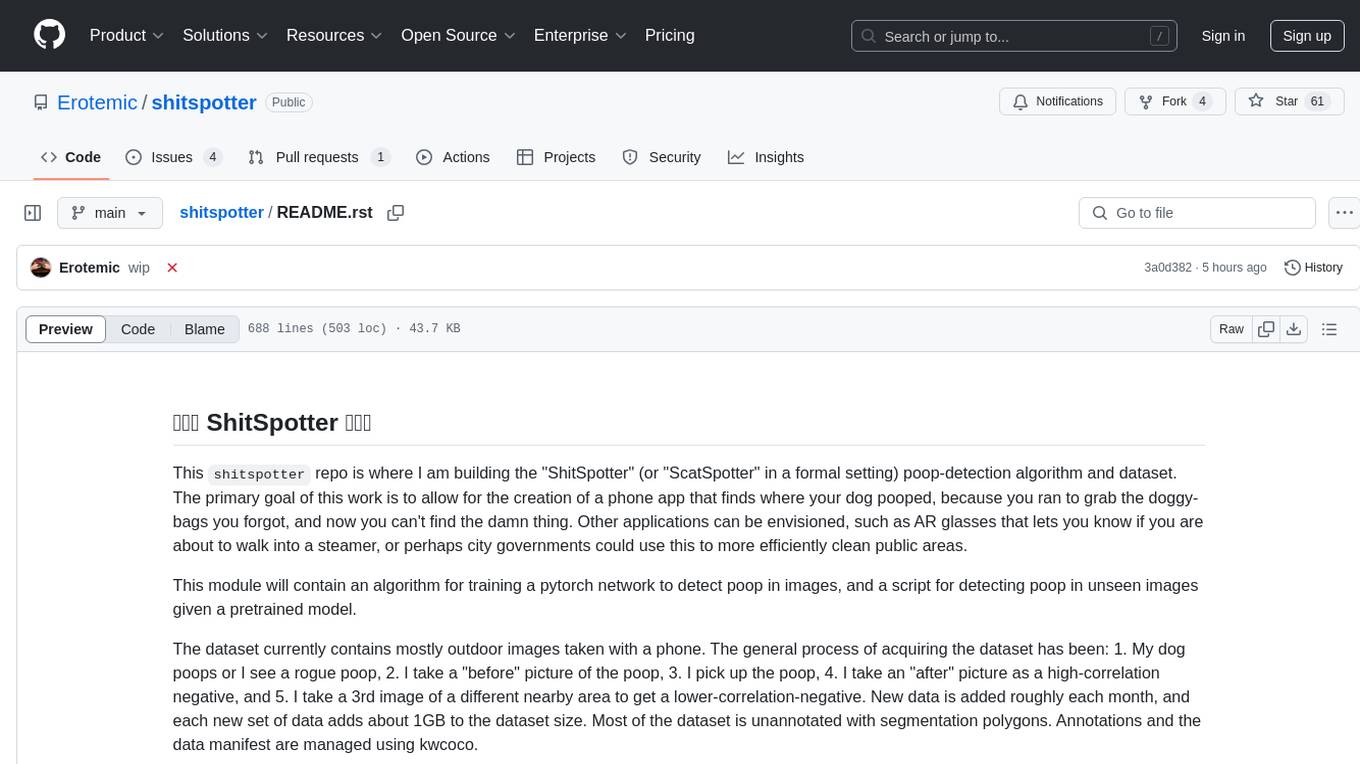
shitspotter
The 'ShitSpotter' repository is dedicated to developing a poop-detection algorithm and dataset for creating a phone app that helps locate dog poop in outdoor environments. The project involves training a PyTorch network to detect poop in images and provides scripts for detecting poop in unseen images using a pretrained model. The dataset consists of mostly outdoor images taken with a phone, with a process involving before and after pictures of the poop. The project aims to enable various applications, such as AR glasses for poop detection and efficient cleaning of public areas by city governments. The code, dataset, and pretrained models are open source with permissive licensing and distributed via IPFS, BitTorrent, and centralized mechanisms.
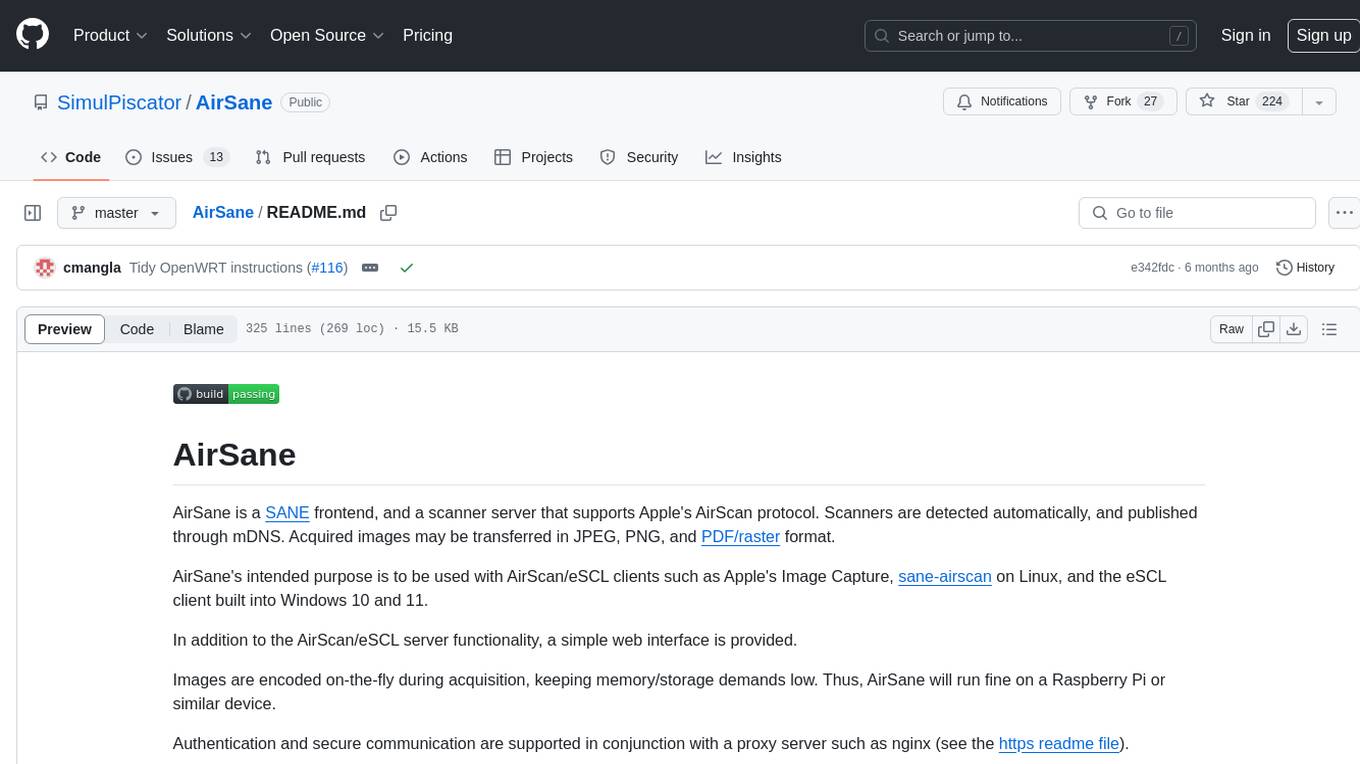
AirSane
AirSane is a SANE frontend and scanner server that supports Apple's AirScan protocol. It automatically detects scanners and publishes them through mDNS. Acquired images can be transferred in JPEG, PNG, and PDF/raster format. The tool is intended to be used with AirScan/eSCL clients such as Apple's Image Capture, sane-airscan on Linux, and the eSCL client built into Windows 10 and 11. It provides a simple web interface and encodes images on-the-fly to keep memory/storage demands low, making it suitable for devices like Raspberry Pi. Authentication and secure communication are supported in conjunction with a proxy server like nginx. AirSane has been reverse-engineered from Apple's AirScanScanner client communication protocol and offers a range of installation and configuration options for different operating systems.
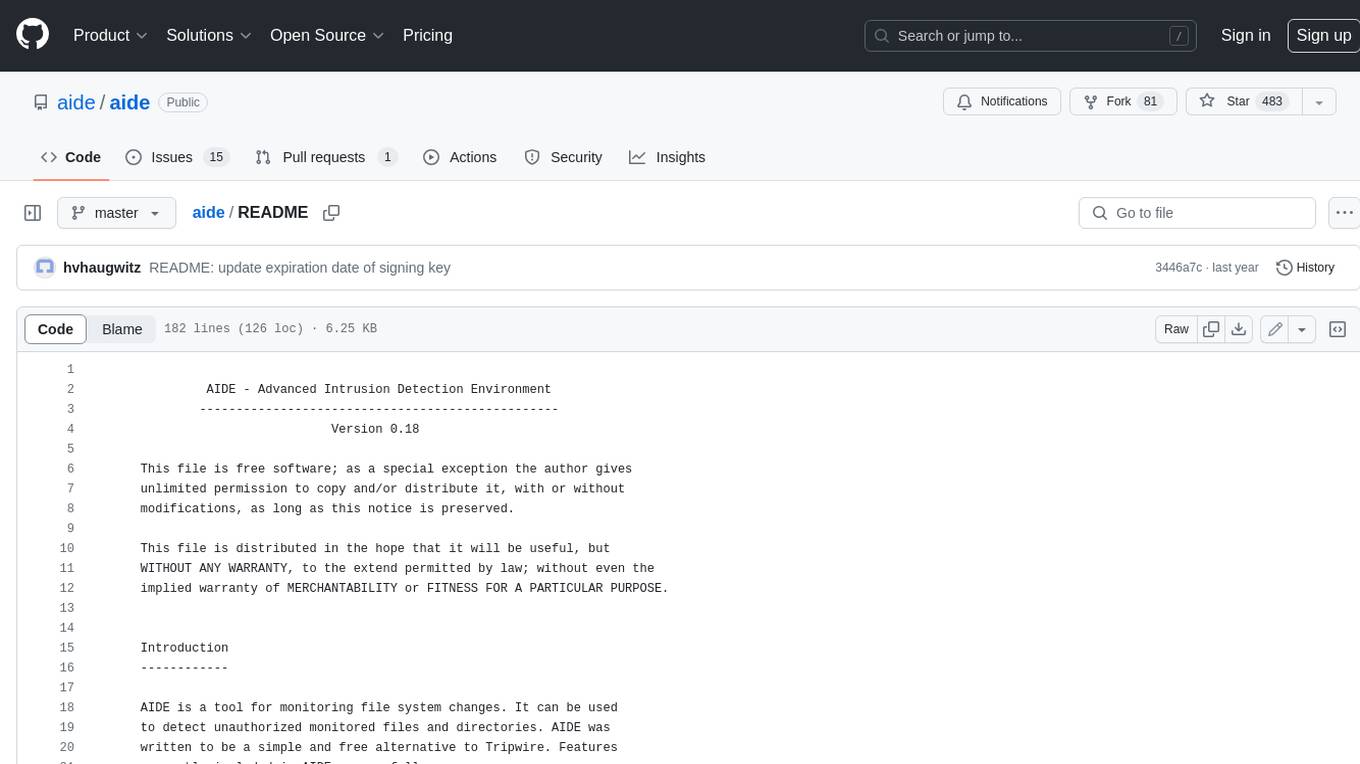
aide
AIDE (Advanced Intrusion Detection Environment) is a tool for monitoring file system changes. It can be used to detect unauthorized changes to monitored files and directories. AIDE was written to be a simple and free alternative to Tripwire. Features currently included in AIDE are as follows: o File attributes monitored: permissions, inode, user, group file size, mtime, atime, ctime, links and growing size. o Checksums and hashes supported: SHA1, MD5, RMD160, and TIGER. CRC32, HAVAL and GOST if Mhash support is compiled in. o Plain text configuration files and database for simplicity. o Rules, variables and macros that can be customized to local site or system policies. o Powerful regular expression support to selectively include or exclude files and directories to be monitored. o gzip database compression if zlib support is compiled in. o Free software licensed under the GNU General Public License v2.
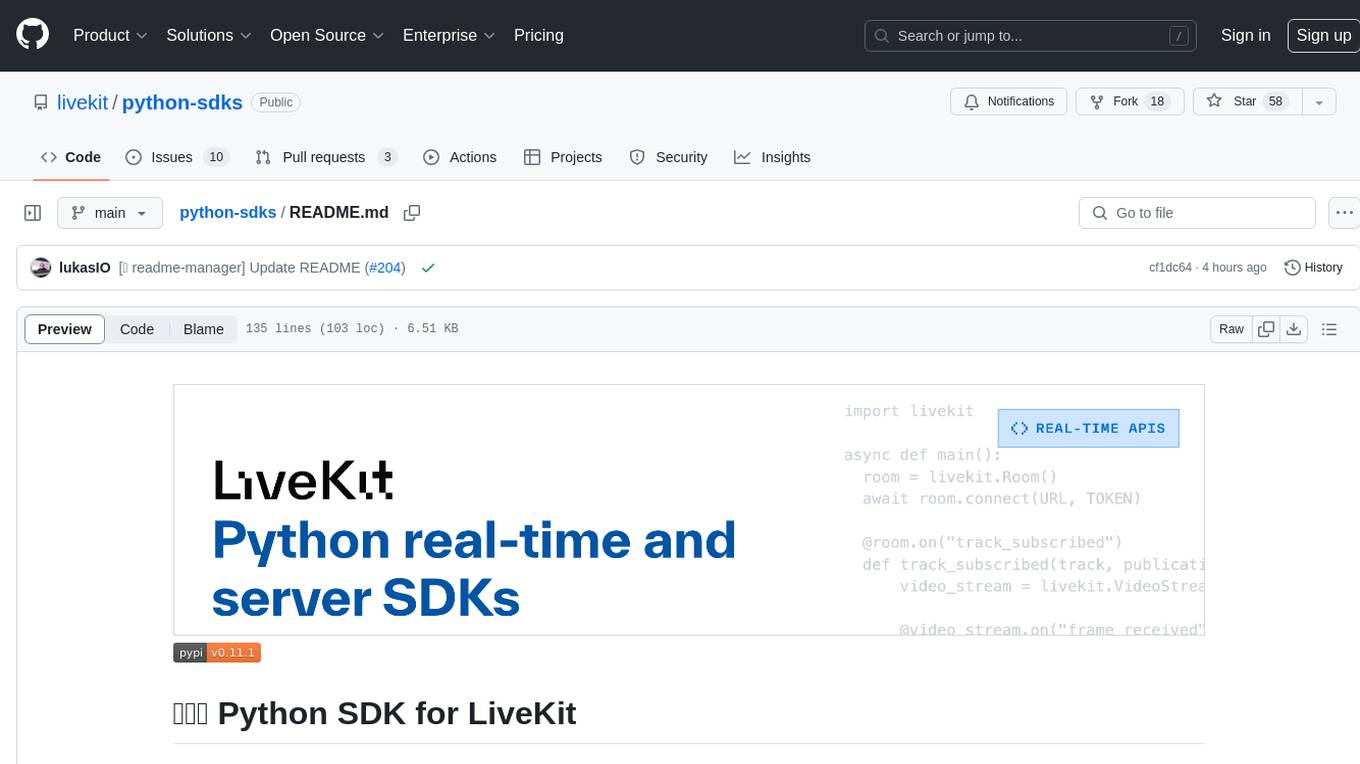
python-sdks
Python SDK for LiveKit enables developers to easily integrate real-time video, audio, and data features into their Python applications. By connecting to a LiveKit server, users can quickly build interactive live streaming or video call applications with minimal code. The SDK includes packages for real-time participant connection and access token generation, making it simple to create rooms and manage participants. With asyncio and aiohttp support, developers can seamlessly interact with the LiveKit server API and handle real-time communication tasks effortlessly.
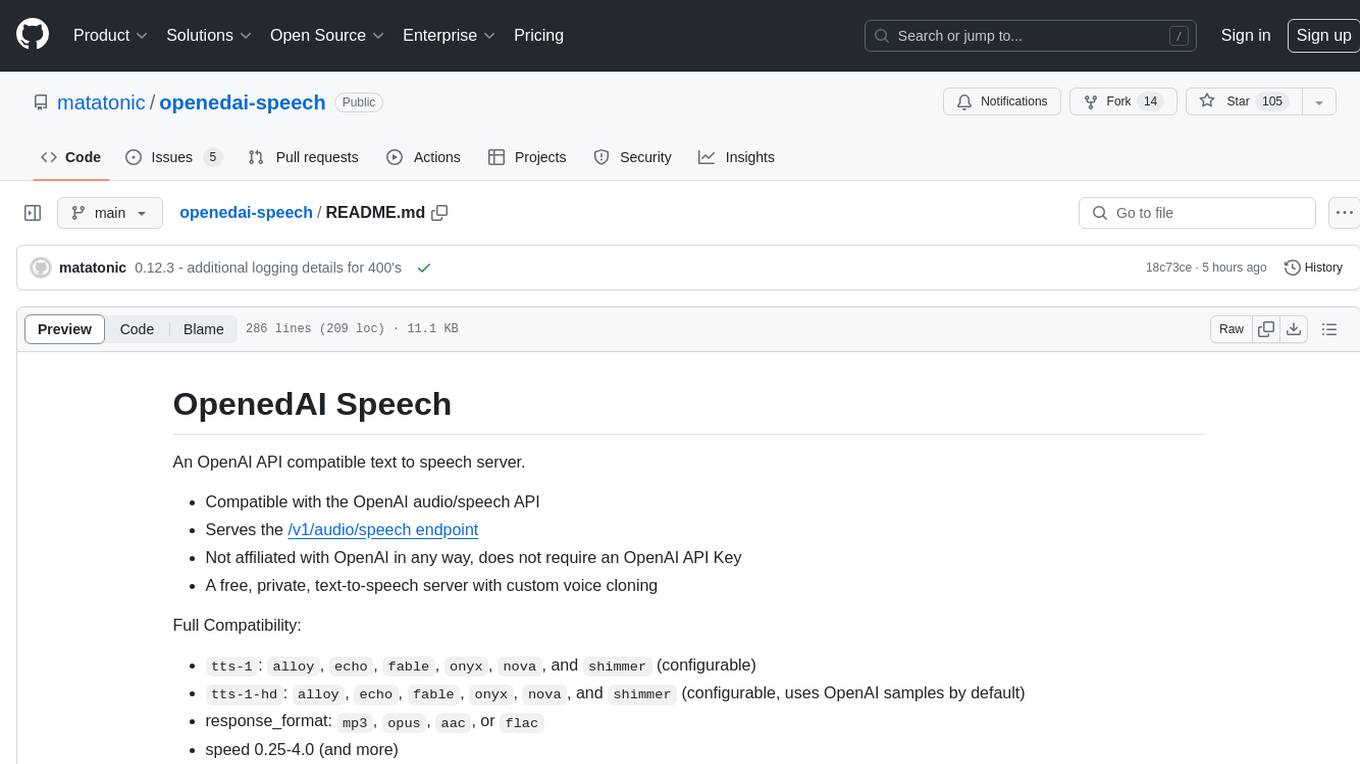
openedai-speech
OpenedAI Speech is a free, private text-to-speech server compatible with the OpenAI audio/speech API. It offers custom voice cloning and supports various models like tts-1 and tts-1-hd. Users can map their own piper voices and create custom cloned voices. The server provides multilingual support with XTTS voices and allows fixing incorrect sounds with regex. Recent changes include bug fixes, improved error handling, and updates for multilingual support. Installation can be done via Docker or manual setup, with usage instructions provided. Custom voices can be created using Piper or Coqui XTTS v2, with guidelines for preparing audio files. The tool is suitable for tasks like generating speech from text, creating custom voices, and multilingual text-to-speech applications.
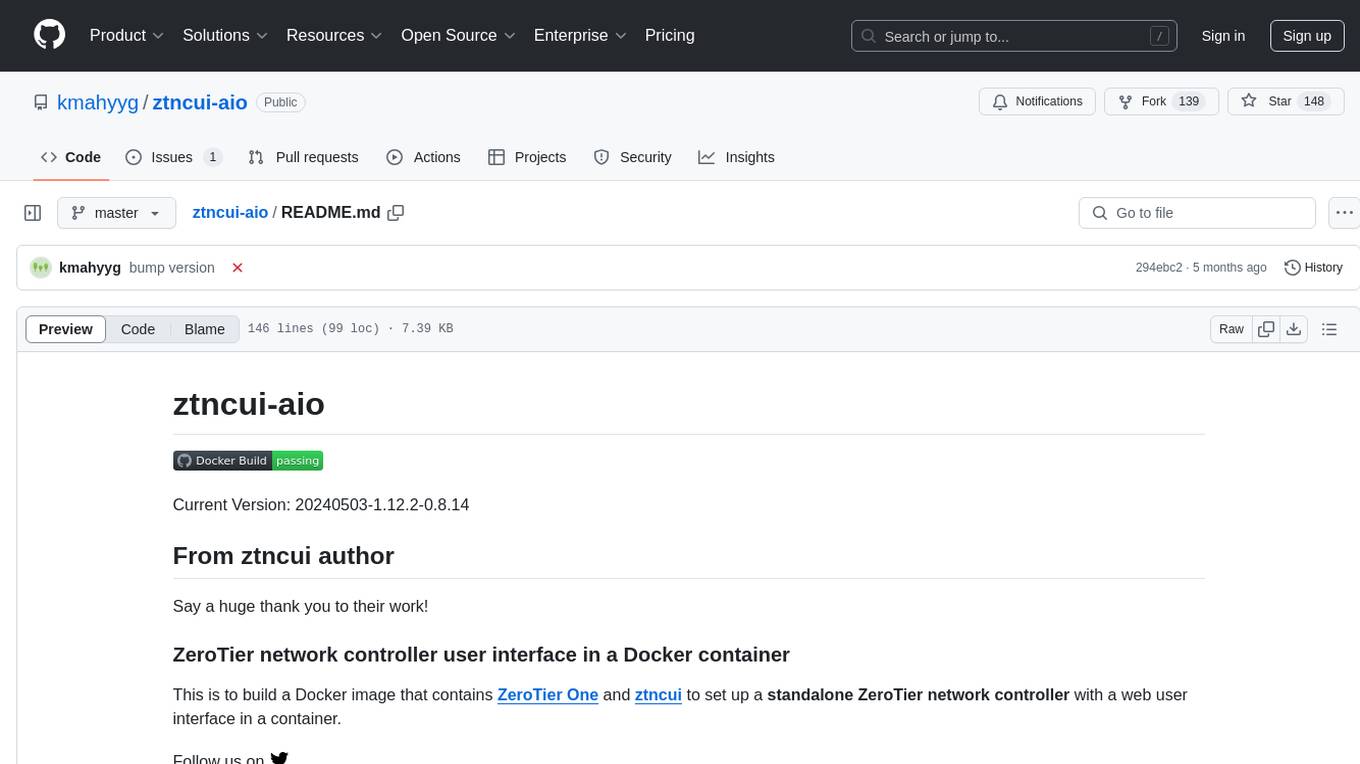
ztncui-aio
This repository contains a Docker image with ZeroTier One and ztncui to set up a standalone ZeroTier network controller with a web user interface. It provides features like Golang auto-mkworld for generating a planet file, supports local persistent storage configuration, and includes a public file server. Users can build the Docker image, set up the container with specific environment variables, and manage the ZeroTier network controller through the web interface.

PyRIT
PyRIT is an open access automation framework designed to empower security professionals and ML engineers to red team foundation models and their applications. It automates AI Red Teaming tasks to allow operators to focus on more complicated and time-consuming tasks and can also identify security harms such as misuse (e.g., malware generation, jailbreaking), and privacy harms (e.g., identity theft). The goal is to allow researchers to have a baseline of how well their model and entire inference pipeline is doing against different harm categories and to be able to compare that baseline to future iterations of their model. This allows them to have empirical data on how well their model is doing today, and detect any degradation of performance based on future improvements.
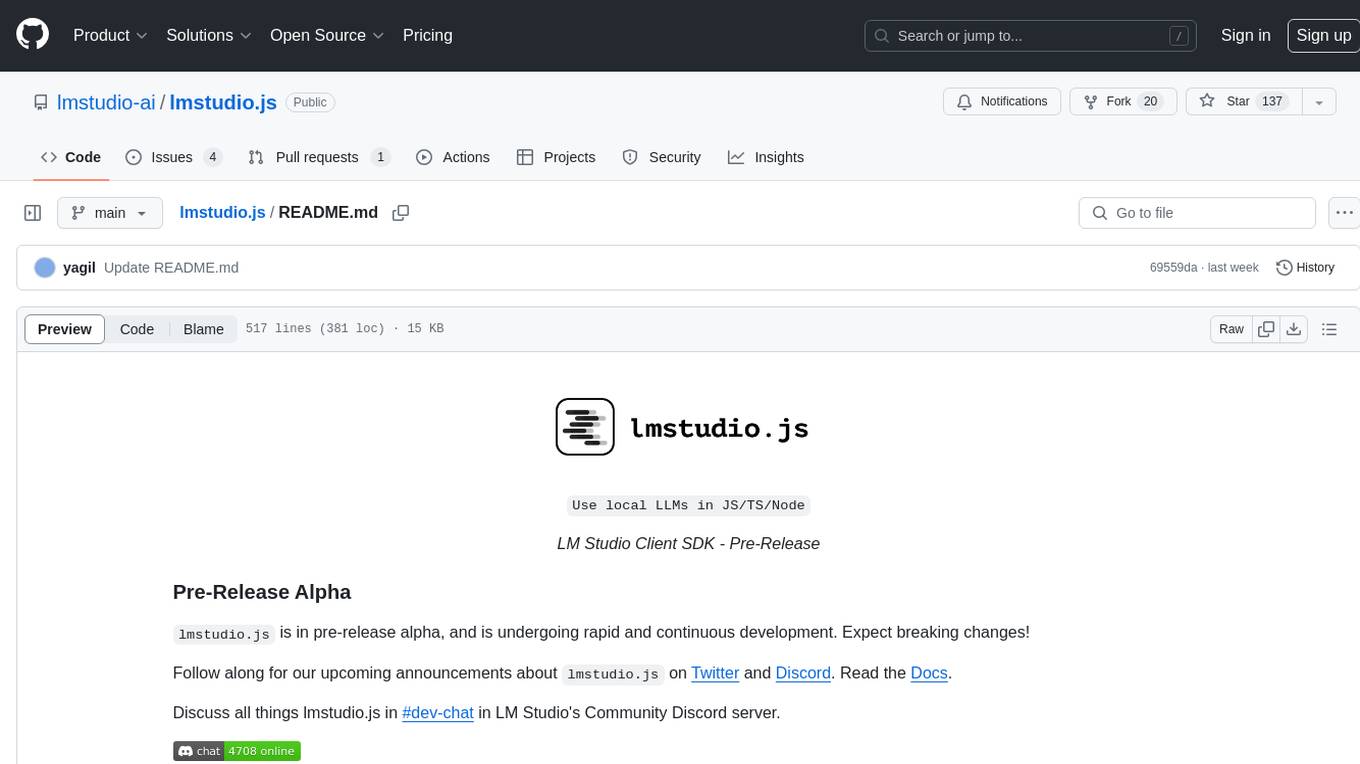
lmstudio.js
lmstudio.js is a pre-release alpha client SDK for LM Studio, allowing users to use local LLMs in JS/TS/Node. It is currently undergoing rapid development with breaking changes expected. Users can follow LM Studio's announcements on Twitter and Discord. The SDK provides API usage for loading models, predicting text, setting up the local LLM server, and more. It supports features like custom loading progress tracking, model unloading, structured output prediction, and cancellation of predictions. Users can interact with LM Studio through the CLI tool 'lms' and perform tasks like text completion, conversation, and getting prediction statistics.
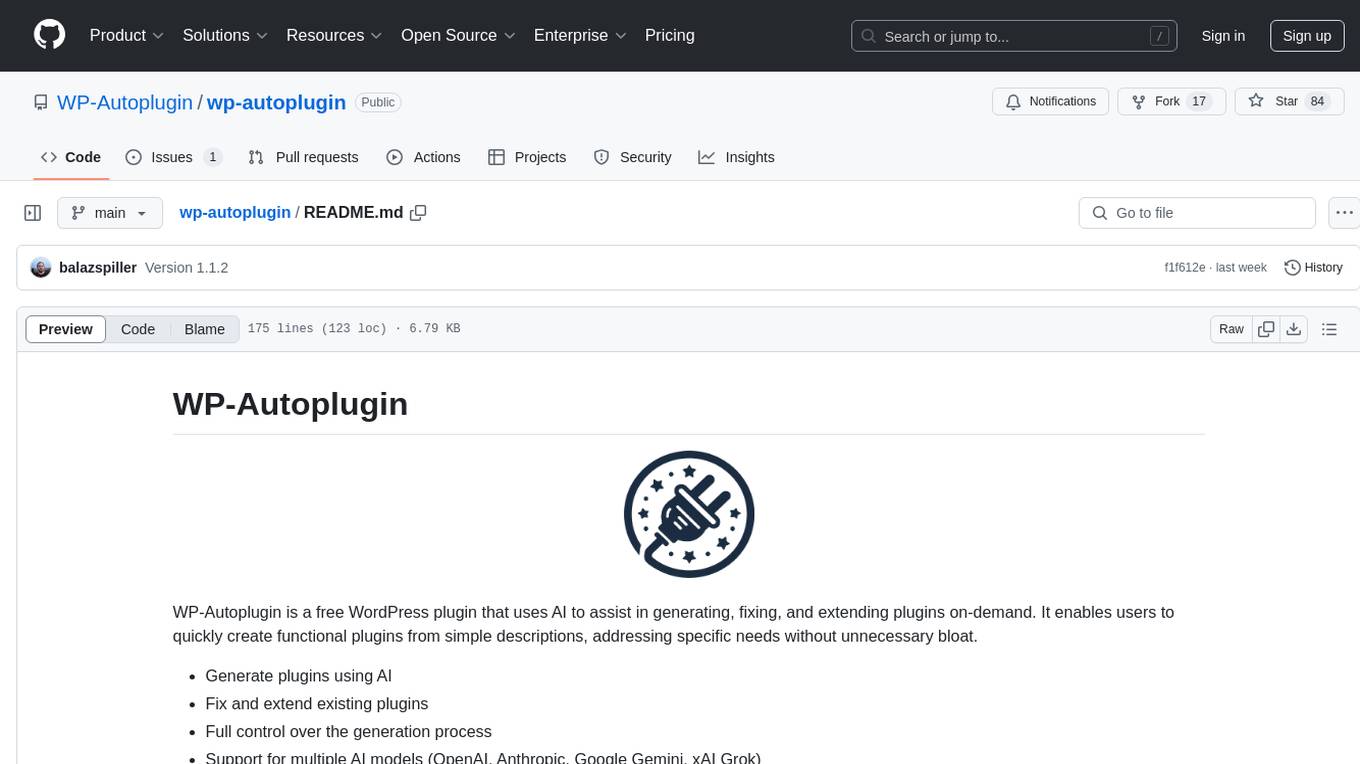
wp-autoplugin
WP-Autoplugin is a free WordPress plugin that uses AI to assist in generating, fixing, and extending plugins on-demand. It enables users to quickly create functional plugins from simple descriptions, addressing specific needs without unnecessary bloat. Users can generate plugins using AI, fix and extend existing plugins, have full control over the generation process, view the list of generated plugins for easy management, and auto-detect fatal errors. The plugin offers practical solutions for creating lightweight alternatives, custom solutions, and developer foundations. It supports various AI models like GPT-3.5 Turbo, GPT-4, Claude 3.5 Sonnet, Google Gemini Flash 2.0, xAI Grok-beta, and more. WP-Autoplugin is completely free, open-source, privacy-focused, and allows users to bring their own API key for AI usage.
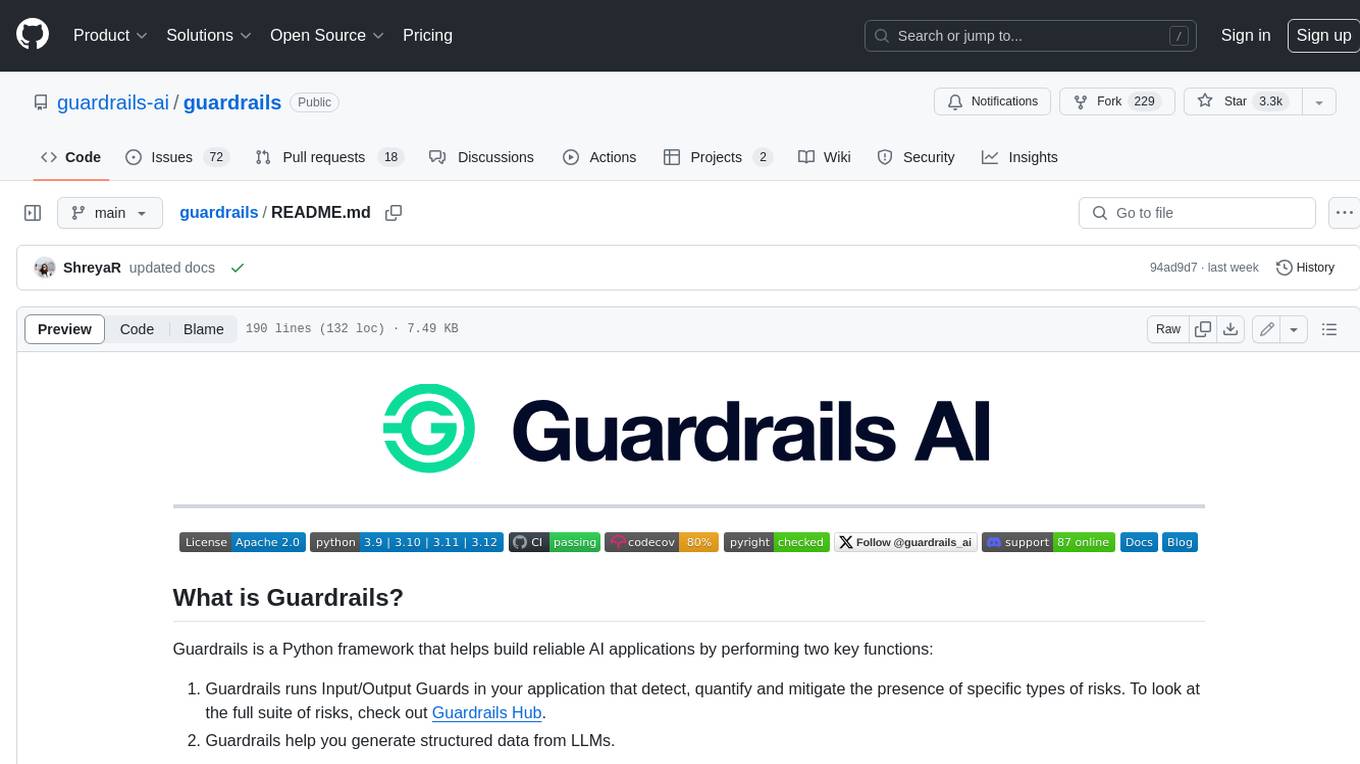
guardrails
Guardrails is a Python framework that helps build reliable AI applications by performing two key functions: 1. Guardrails runs Input/Output Guards in your application that detect, quantify and mitigate the presence of specific types of risks. To look at the full suite of risks, check out Guardrails Hub. 2. Guardrails help you generate structured data from LLMs.
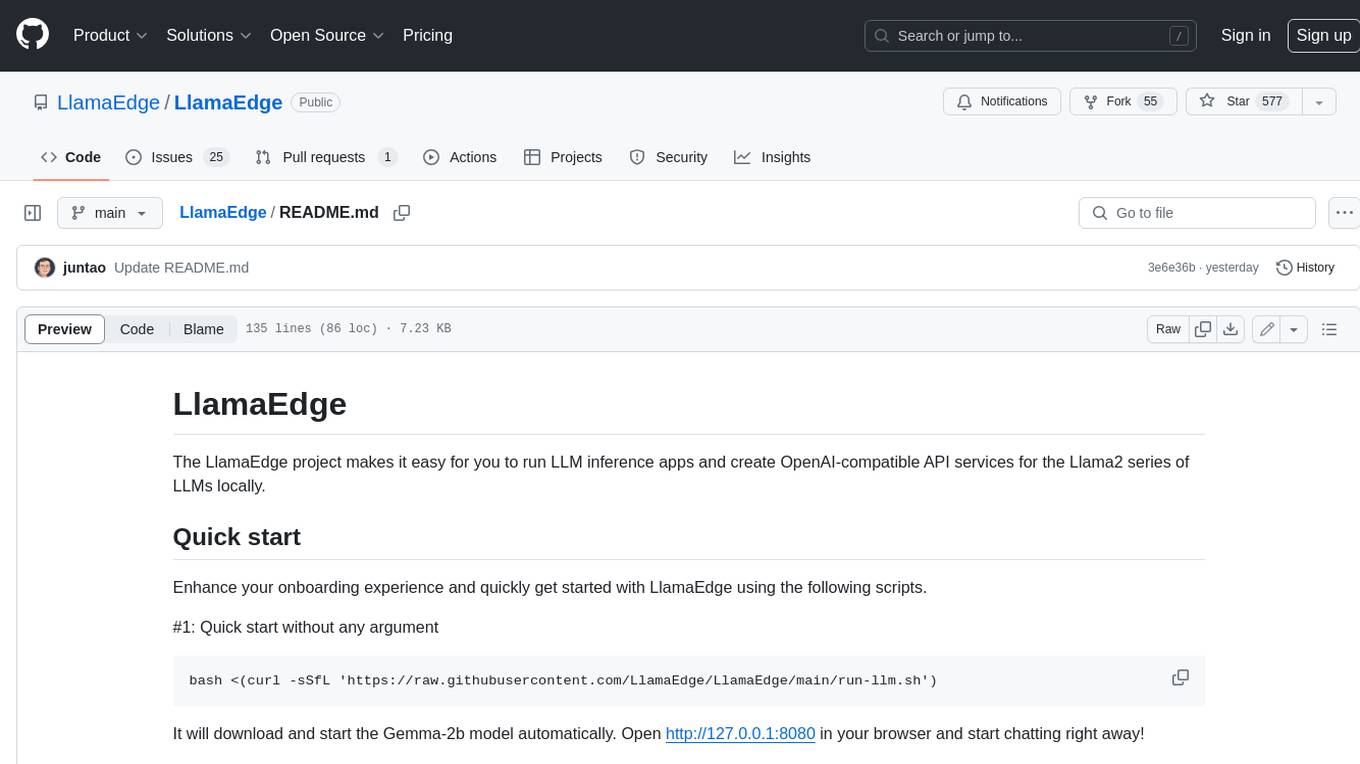
LlamaEdge
The LlamaEdge project makes it easy to run LLM inference apps and create OpenAI-compatible API services for the Llama2 series of LLMs locally. It provides a Rust+Wasm stack for fast, portable, and secure LLM inference on heterogeneous edge devices. The project includes source code for text generation, chatbot, and API server applications, supporting all LLMs based on the llama2 framework in the GGUF format. LlamaEdge is committed to continuously testing and validating new open-source models and offers a list of supported models with download links and startup commands. It is cross-platform, supporting various OSes, CPUs, and GPUs, and provides troubleshooting tips for common errors.
20 - OpenAI Gpts
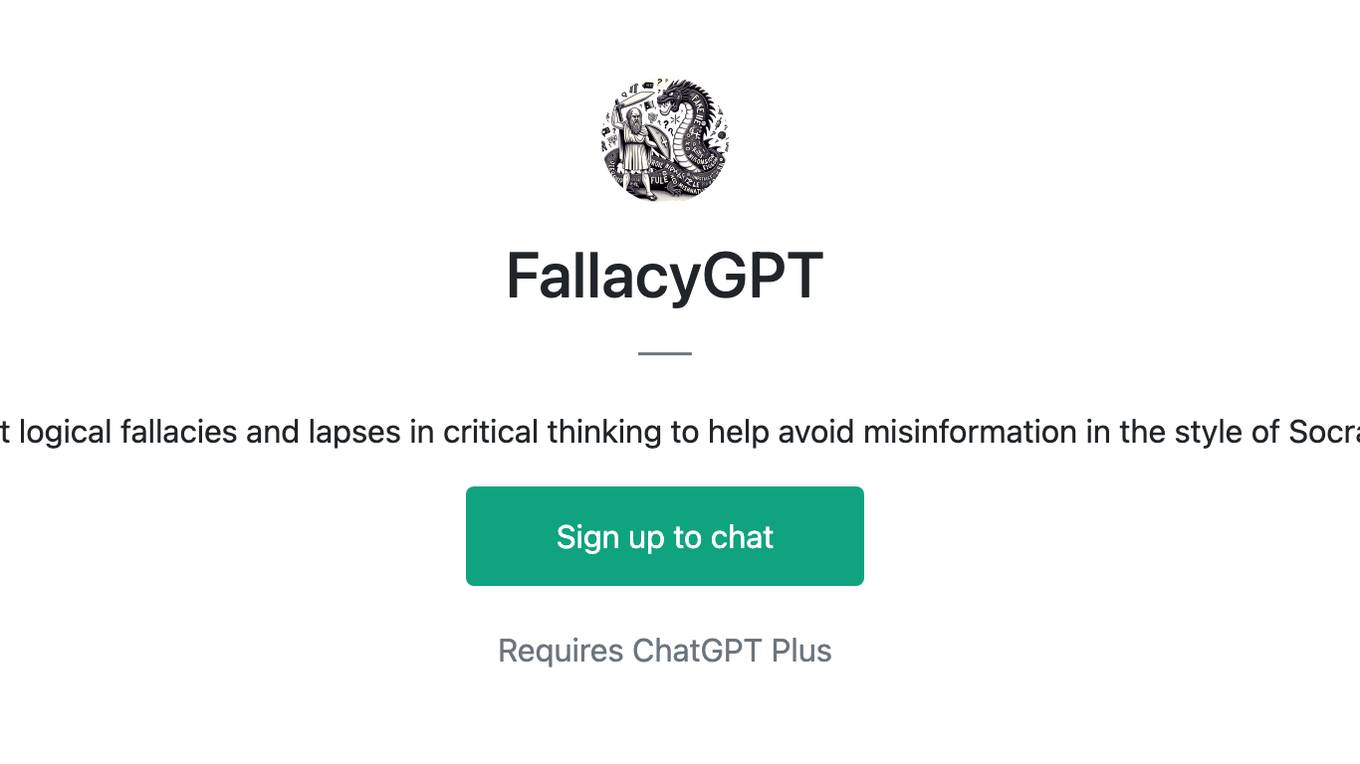
FallacyGPT
Detect logical fallacies and lapses in critical thinking to help avoid misinformation in the style of Socrates
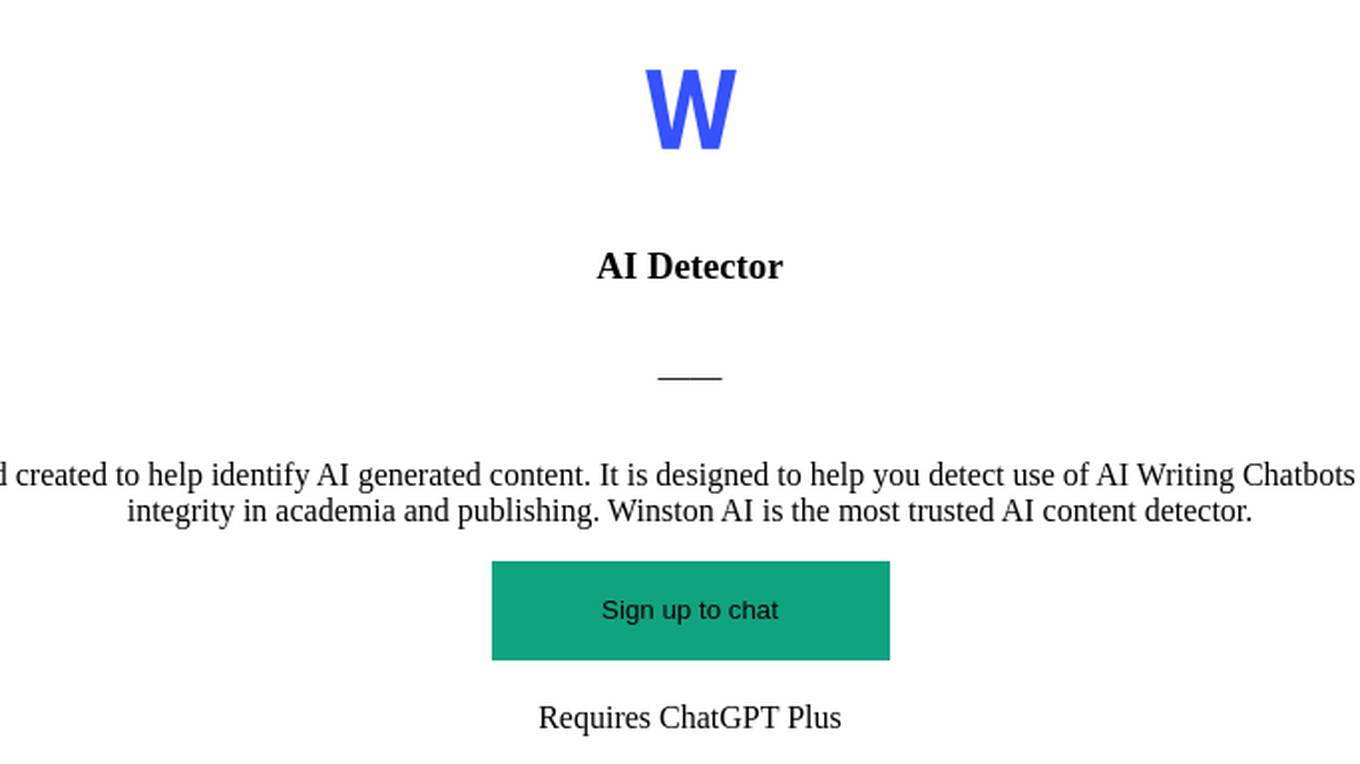
AI Detector
AI Detector GPT is powered by Winston AI and created to help identify AI generated content. It is designed to help you detect use of AI Writing Chatbots such as ChatGPT, Claude and Bard and maintain integrity in academia and publishing. Winston AI is the most trusted AI content detector.
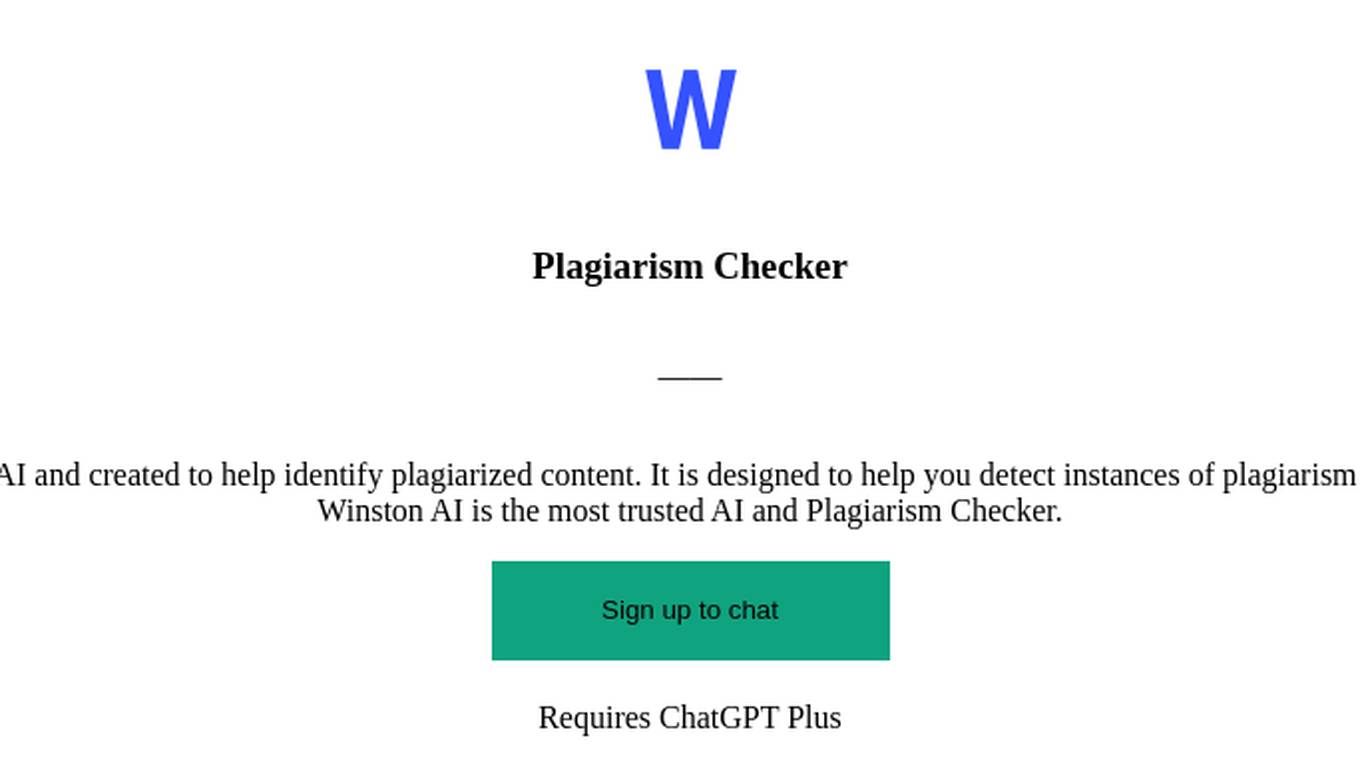
Plagiarism Checker
Plagiarism Checker GPT is powered by Winston AI and created to help identify plagiarized content. It is designed to help you detect instances of plagiarism and maintain integrity in academia and publishing. Winston AI is the most trusted AI and Plagiarism Checker.
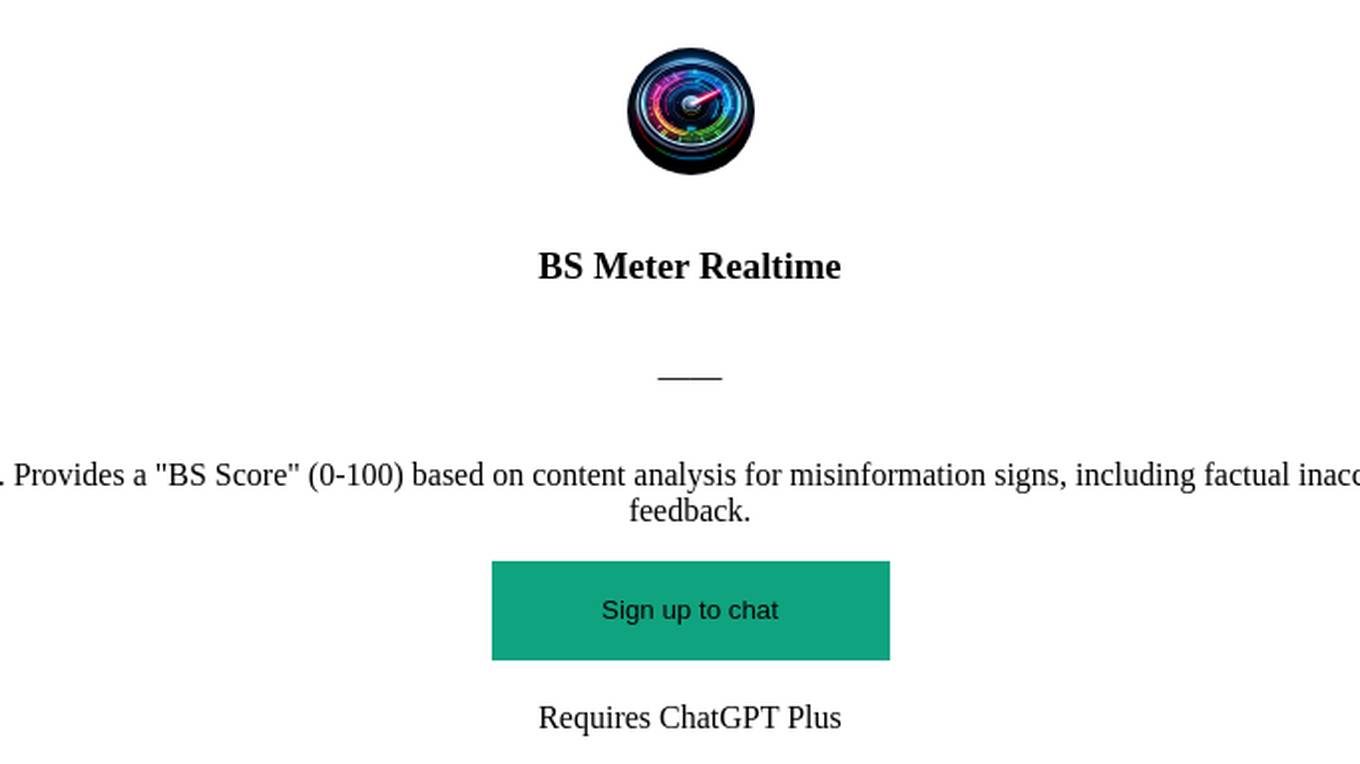
BS Meter Realtime
Detects and measures information credibility. Provides a "BS Score" (0-100) based on content analysis for misinformation signs, including factual inaccuracies and sensationalist language. Real-time feedback.
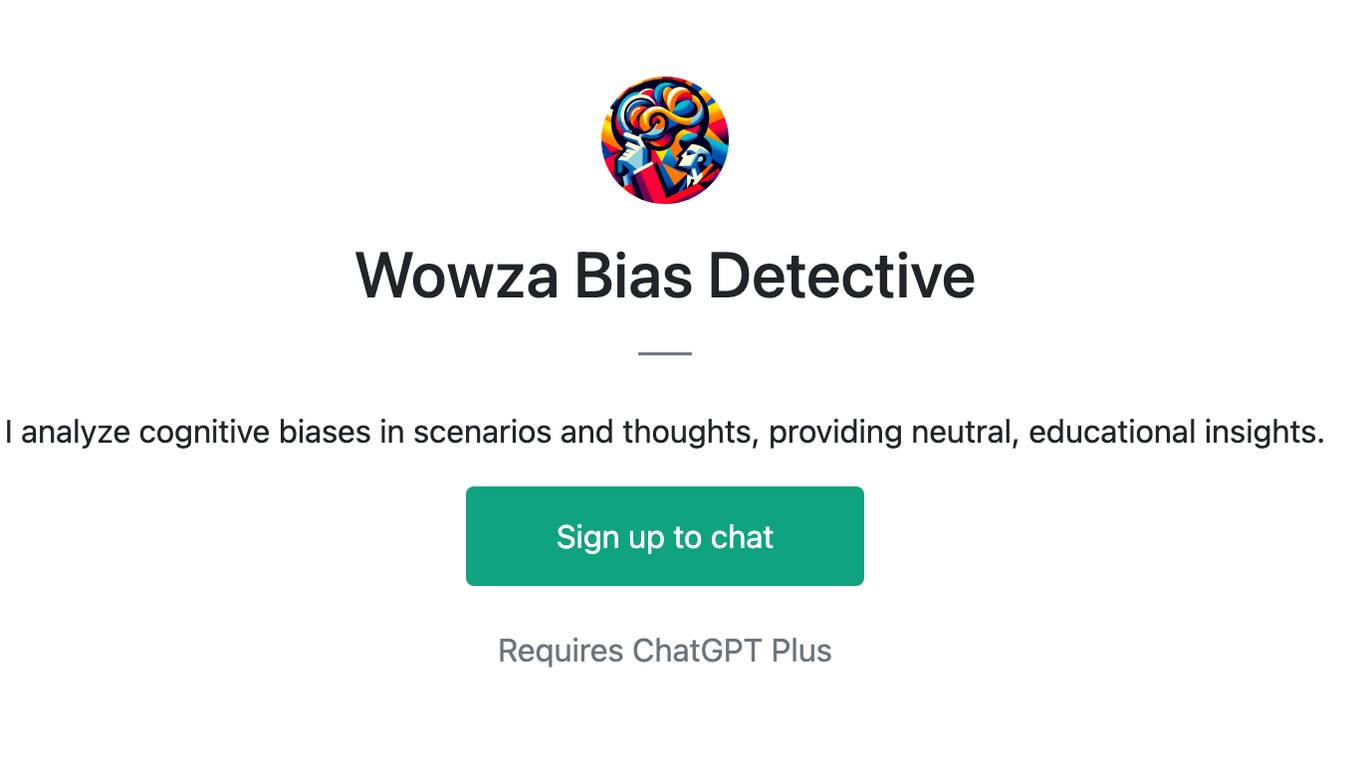
Wowza Bias Detective
I analyze cognitive biases in scenarios and thoughts, providing neutral, educational insights.
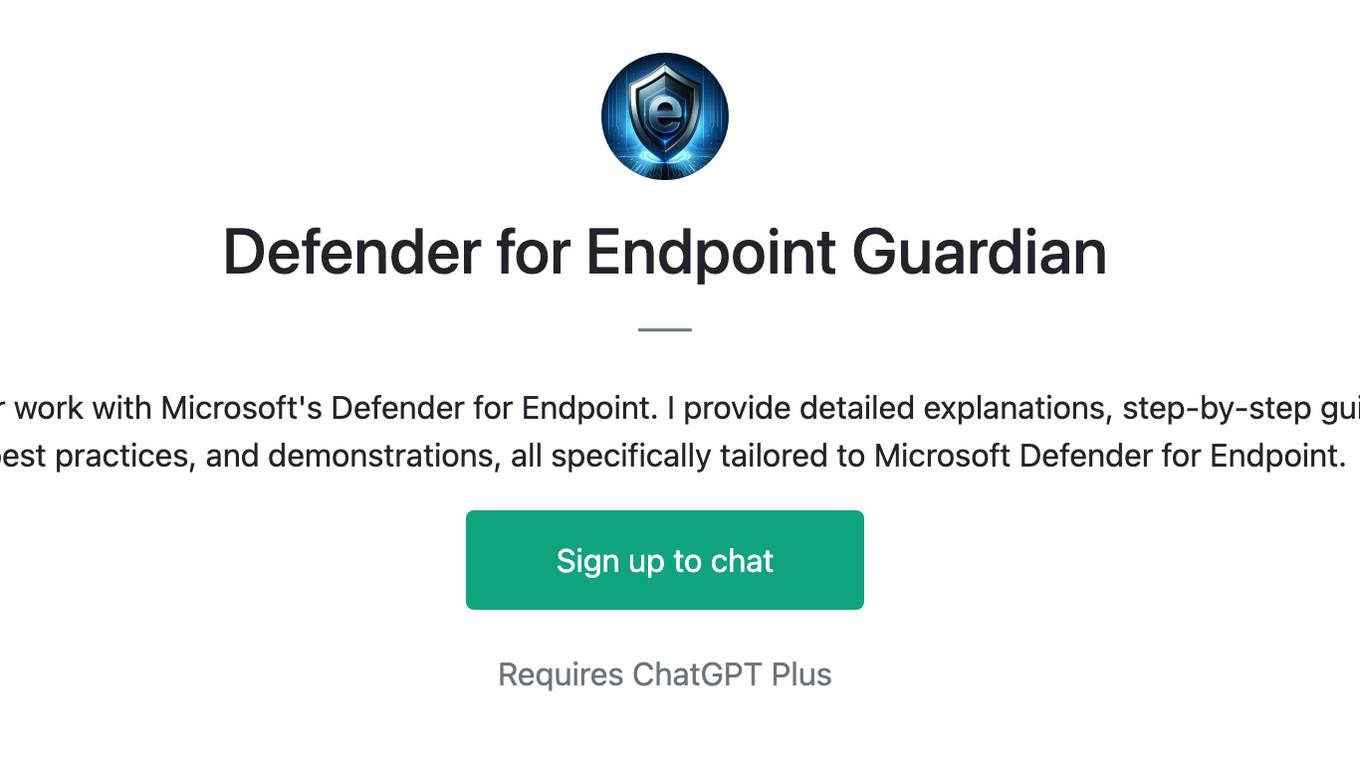
Defender for Endpoint Guardian
To assist individuals seeking to learn about or work with Microsoft's Defender for Endpoint. I provide detailed explanations, step-by-step guides, troubleshooting advice, cybersecurity best practices, and demonstrations, all specifically tailored to Microsoft Defender for Endpoint.
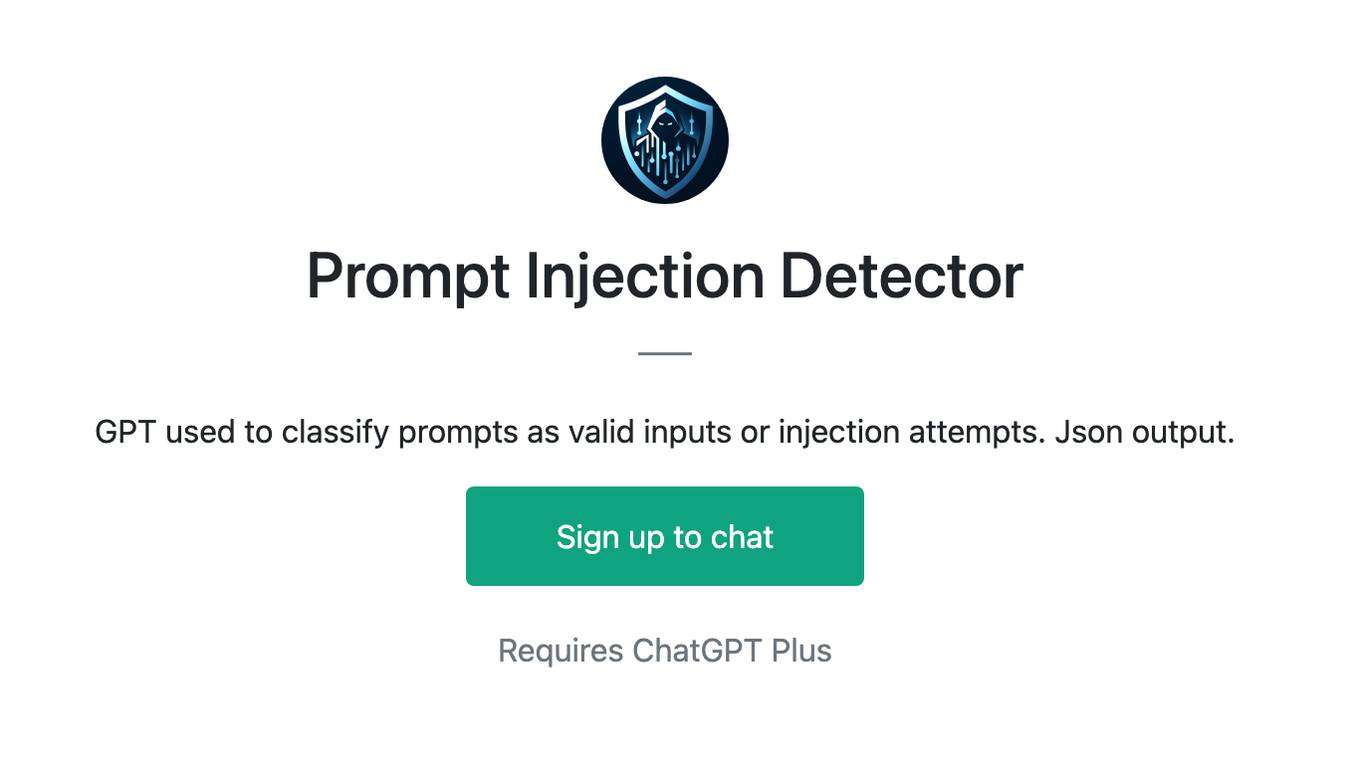
Prompt Injection Detector
GPT used to classify prompts as valid inputs or injection attempts. Json output.
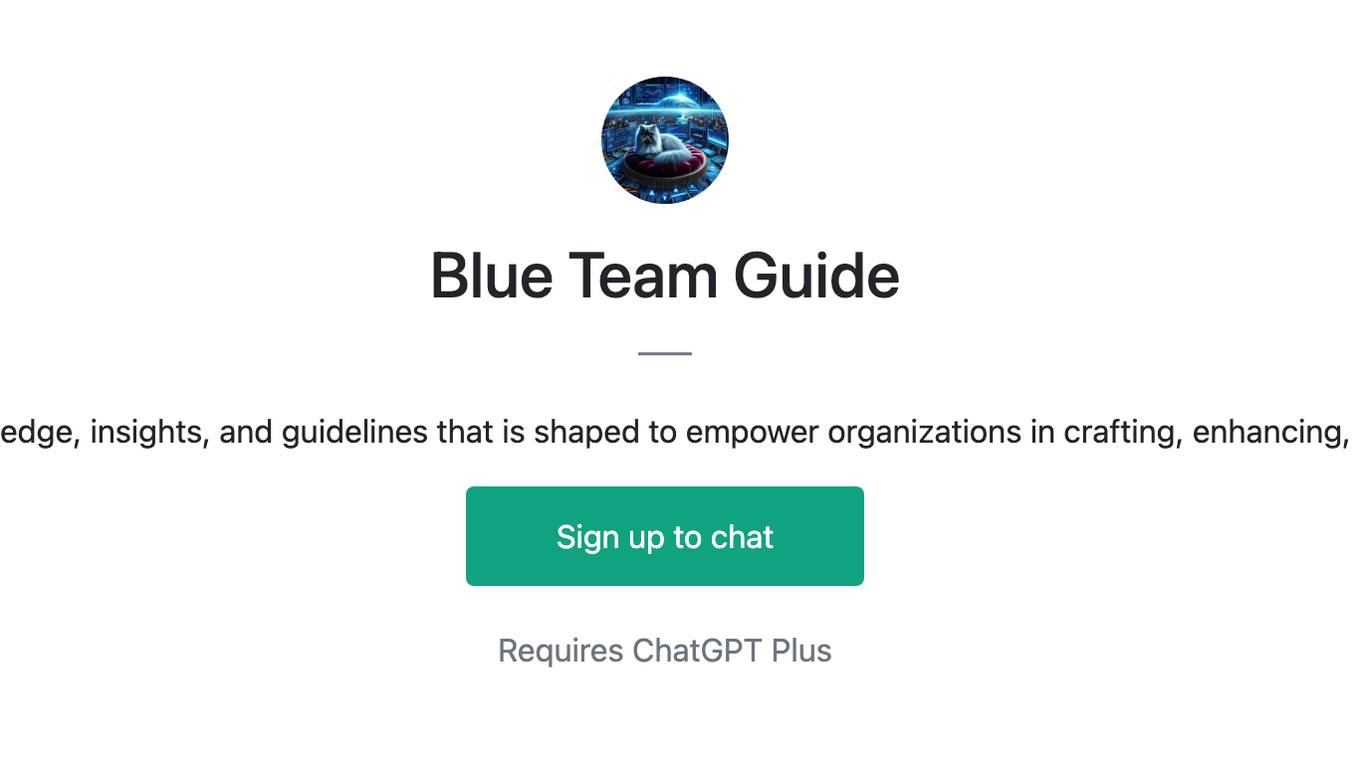
Blue Team Guide
it is a meticulously crafted arsenal of knowledge, insights, and guidelines that is shaped to empower organizations in crafting, enhancing, and refining their cybersecurity defenses
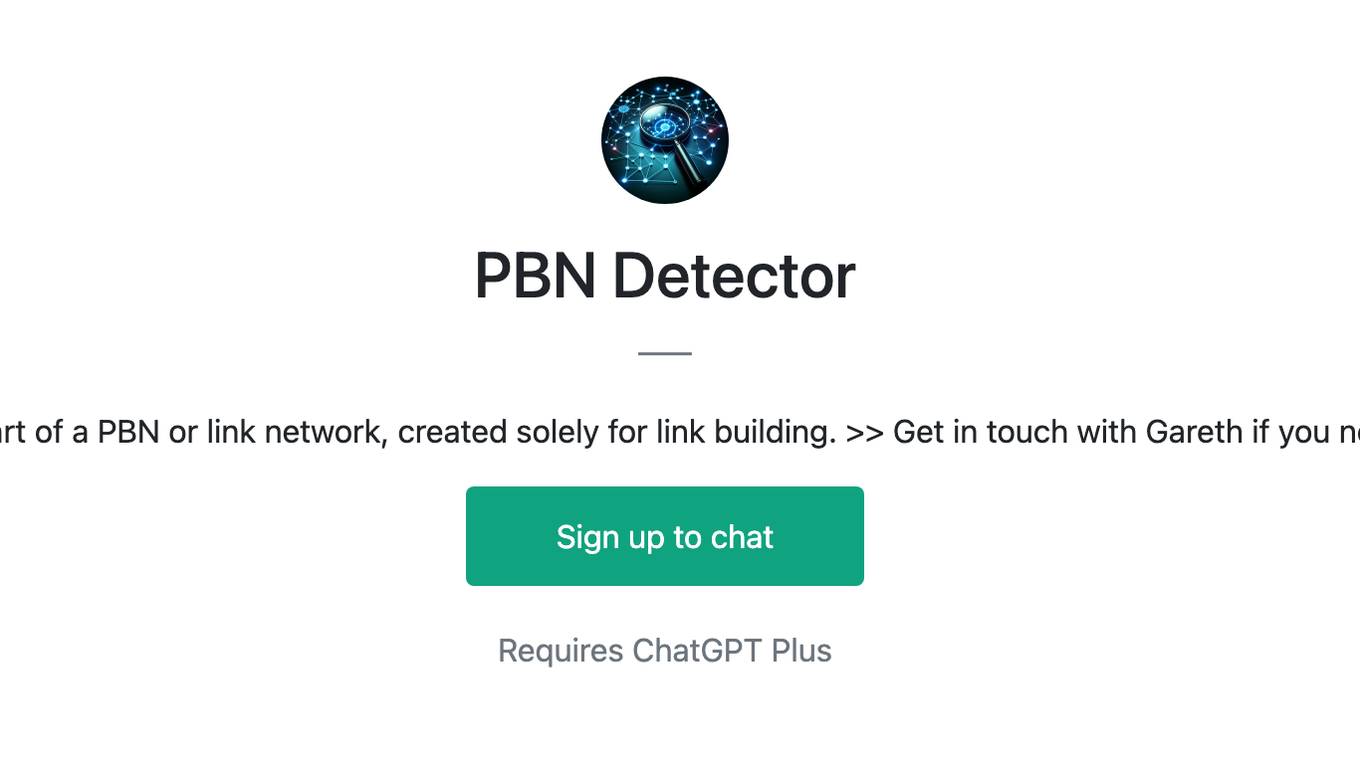
PBN Detector
A tool to help you decide if a website is part of a PBN or link network, created solely for link building. >> Get in touch with Gareth if you need a Freelance SEO for link building <<
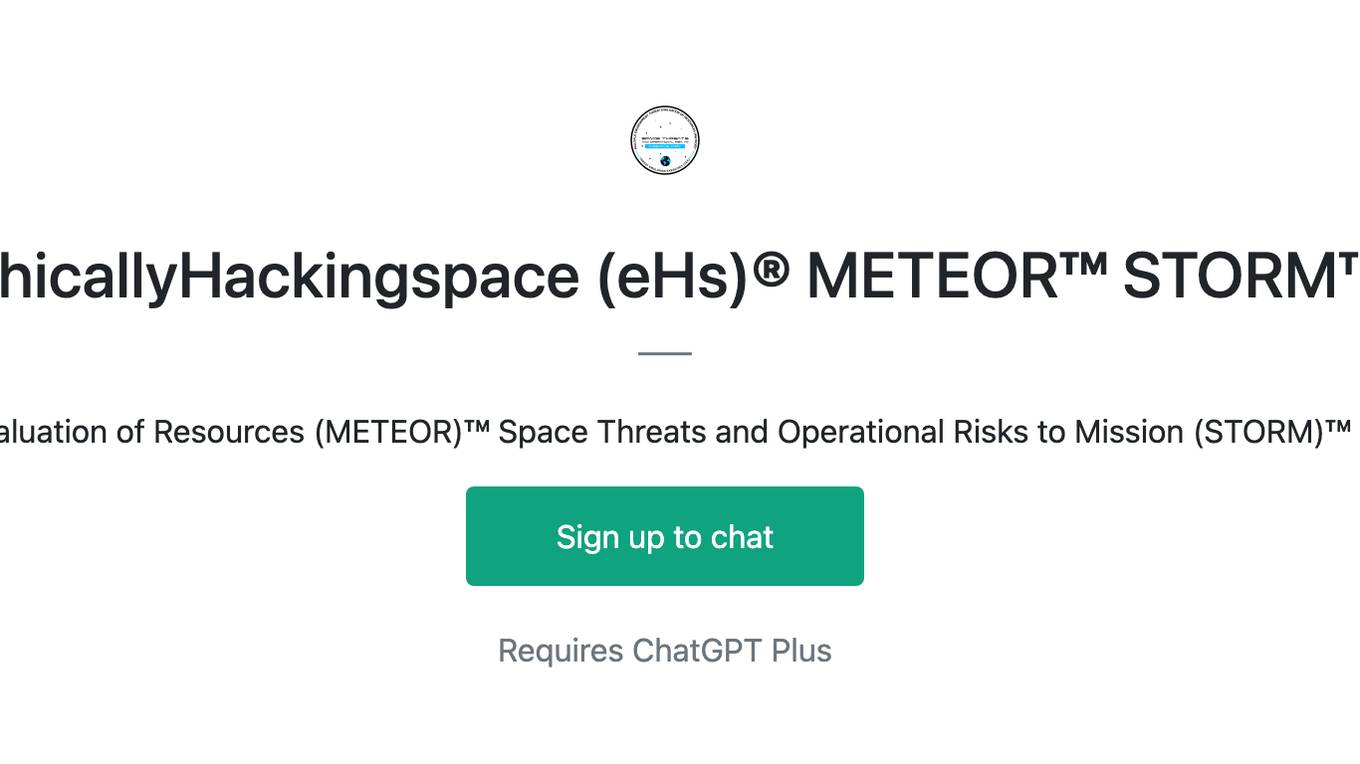
ethicallyHackingspace (eHs)® METEOR™ STORM™
Multiple Environment Threat Evaluation of Resources (METEOR)™ Space Threats and Operational Risks to Mission (STORM)™ non-profit product AI co-pilot
